University of Toronto Faculty of Kinesiology & Physical Education
SPRING 2025 / VOL. 25, NO. 1


University of Toronto Faculty of Kinesiology & Physical Education
SPRING 2025 / VOL. 25, NO. 1

MEETING OF THE MINDS Experts share their knowledge at the inaugural TISS conference
MAKING A SPLASH Ainsley McMurray named a Top 8 Academic All-Canadian
A NEW ERA Nikki Doucet’s transformational leadership in women’s sport
High performance. High integrity.
Introducing the MASTER OF SPORT SCIENCES, Canada’s leading graduate program for people passionate about sports, whether it’s a grassroots community initiative or working with a professional sports team.
Get the curriculum, insights, connections and placements that are integral to raising the bar in sport coaching and performance, sport integrity and sport analytics in today’s world.
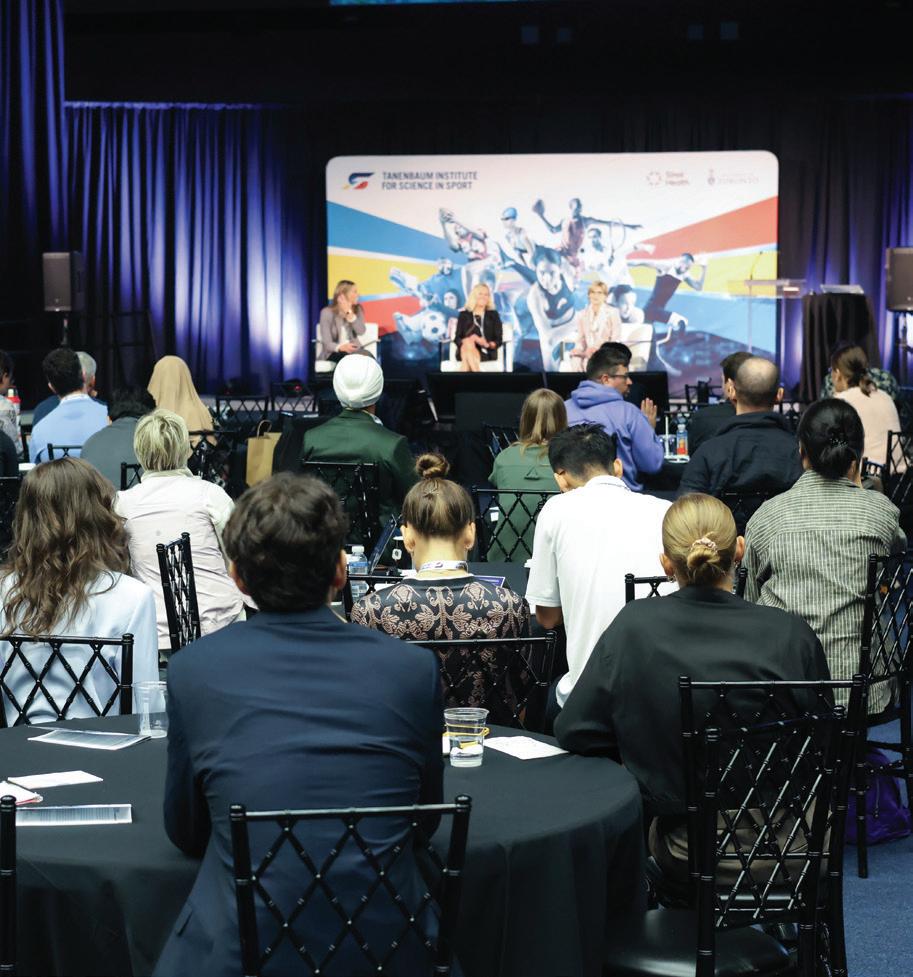
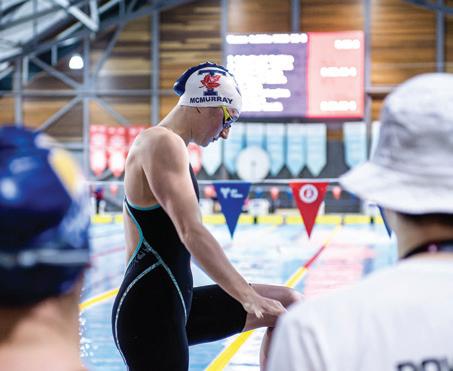

Welcome to another issue of Pursuit magazine. In the two years since we launched the Faculty’s Academic Plan, we have made great strides in realizing our collective vision of advancing healthy living through inclusive movement. One area in particular has emerged as a critical focal point for the Faculty: advancing women’s health and well-being and closing the research gap that exists between studies on men and women.

This issue’s cover story features a study that is putting longheld guidelines under a microscope and raising the bar for women’s health. Recognized as the gold standard in public health recommendations, the Canadian physical activity and dietary guidelines were created using data from only male participants. But now, the Ms. FIT study is measuring the impact of following these guidelines on the cardiovascular and metabolic health of women. In equal measures innovative, collaborative, transformative and inclusive, this research is poised to influence policy and change guidelines, ultimately elevating women’s health and well-being.
These aren’t the only strides our Faculty is making towards achieving gender parity. With equal numbers of men and women on faculty, we are setting an example for gender equity in academia. This balance not only creates a more inclusive environment but also encourages diverse perspectives, which is vital for pushing the boundaries of knowledge and innovation.
Moreover, the Faculty’s efforts to address gender equality extend beyond research and academia to our athletic programs, now offering women more opportunities to participate in a variety of sports, both recreationally and competitively. Out of the 844 student-athletes who represented the Varsity Blues last year, for example, almost half (370) were women.
In part, this is also the result of our faculty’s research into identifying and removing barriers that have limited the involvement of girls and women in sports, as well as our Faculty’s strategic intent to foster a more inclusive culture across all our programs – both academic and athletic.
I hope you’ll enjoy reading about some of these efforts to close the gender gap in research, academics and athletics. As always, we couldn’t do it without the support of you, our valued alumni and friends.
Sincerely,
Gretchen Kerr, Professor and Dean Faculty of Kinesiology & Physical Education
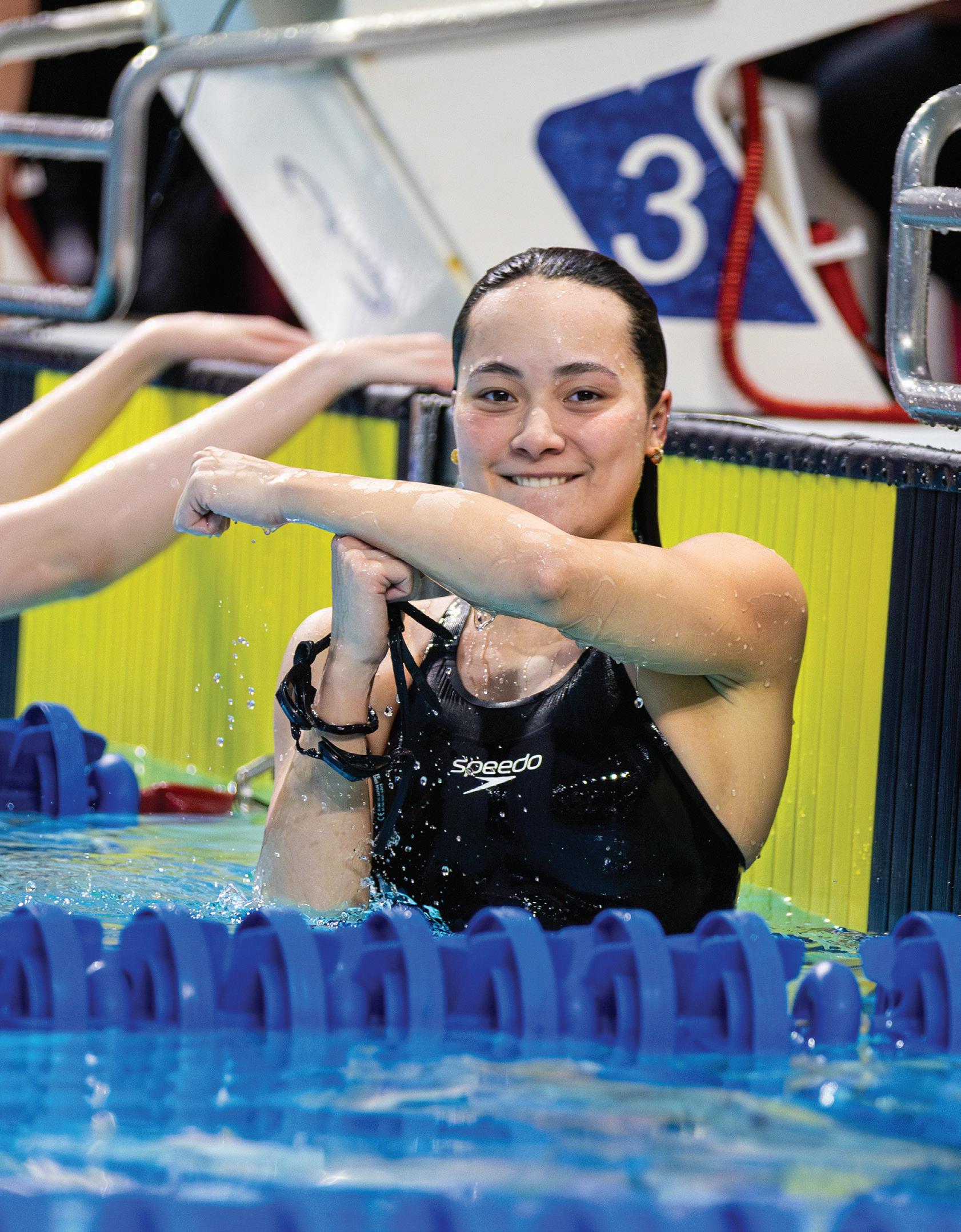
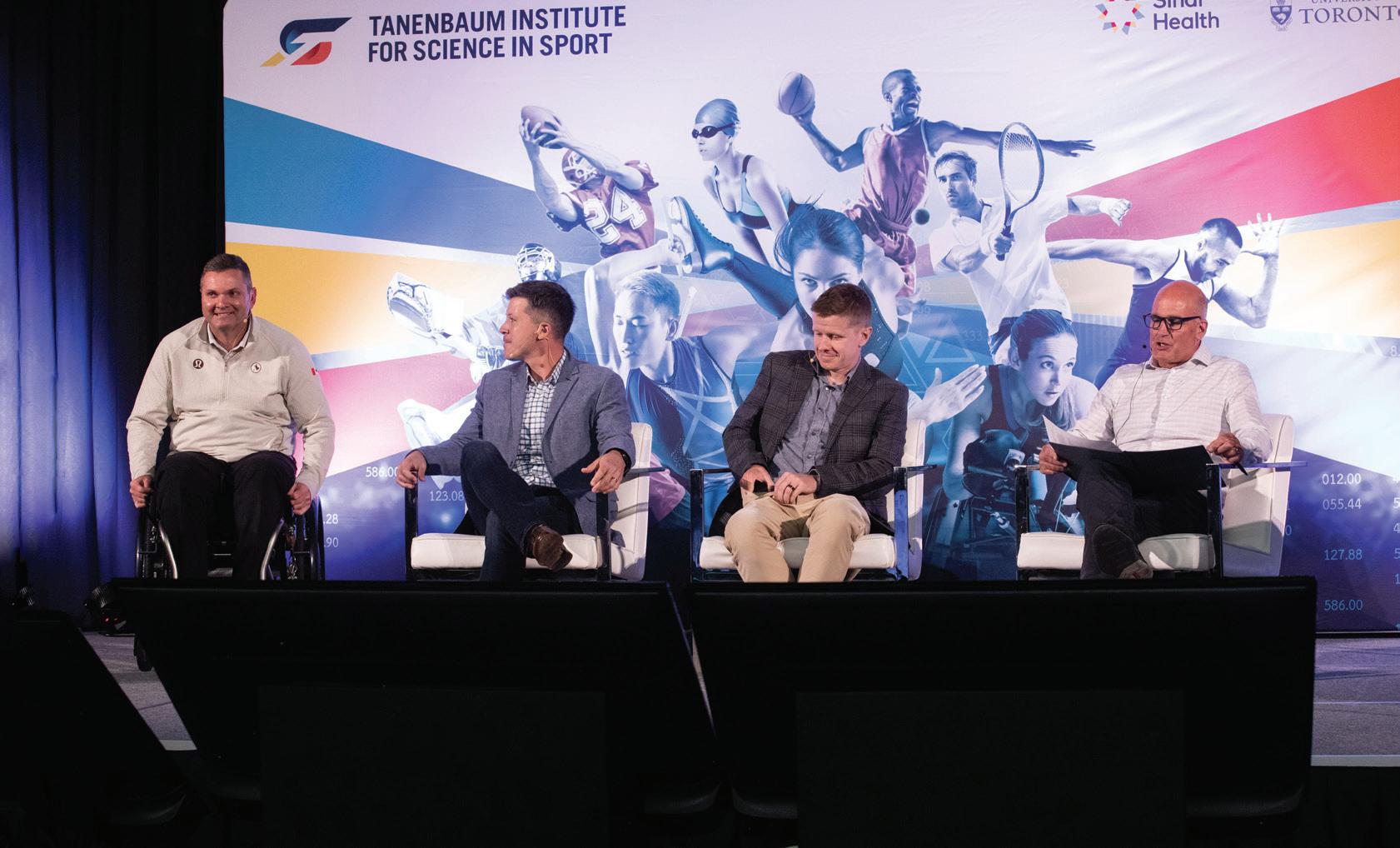
“All innovations benefit from athlete input” and other insights from the inaugural TISS conference
Protein is only good for building muscle. Too much protein can be bad for your kidneys ... If you’re an athlete – or someone working with athletes – looking for nutrition advice on the Internet, you’ll come across many such claims. How do you determine what’s true, what’s misconception and what’s simply a myth?
“The conference was an amazing opportunity to enjoy two intense days of experts sharing their accumulated knowledge across a broad spectrum of sport science and sport medicine disciplines.”
If you’re Jennifer Sygo, renowned Canadian dietitian and sports nutritionist, you’ll consult the research, the kind conducted by Daniel Moore, an associate professor at KPE with expertise in protein metabolism and sport nutrition.
“As a practitioner and knowledge translator, I’ve benefited very much from Dan’s breakthrough research,” said Sygo, speaking at the Tanenbaum Institute for Science in Sport (TISS) inaugural conference in September 2024. “It’s had a direct impact on the recommendations I give to athletes, and I’m always pleased to tell them my advice is based on sport nutrition research.”
“Without you, the user, knowledge is really useless,” said Moore, whose presentation on the protein needs of high performance athletes was one of many heard by the large contingent of researchers, clinicians and practitioners who converged on U of T’s Goldring Centre for the two-day conference.
Arriving from different corners of Canada and the world, renowned experts shared the stage with early-career researchers to discuss the role of cutting-edge science in advancing athletic excellence, early athlete training and development, the application of wearable tech in novel sports and much more in between.
“The conference was an amazing opportunity to enjoy two intense days of experts sharing their accumulated knowledge across a broad spectrum of sport science and sport medicine disciplines – all focused on the wellness, safety and performance of high performance athletes – right here in the GTA,” said Ira Jacobs, a professor of exercise physiology at KPE and director of TISS. “It’s wonderful to see it come to fruition after only two years of the institute being operational.”
– Ira Jacobs
Larry Tanenbaum, chairman of Maple Leaf Sports and Entertainment (MLSE), whose $20-million gift through the Larry and Judy Tanenbaum Family Foundation helped to establish TISS in 2022, addressed the participants of the conference in a recorded message.
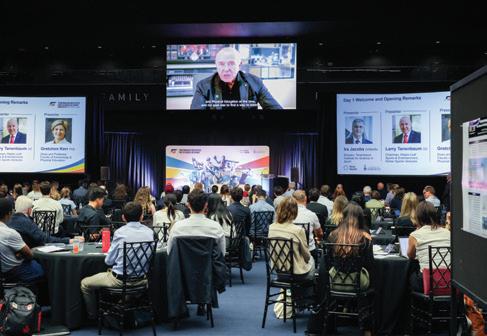

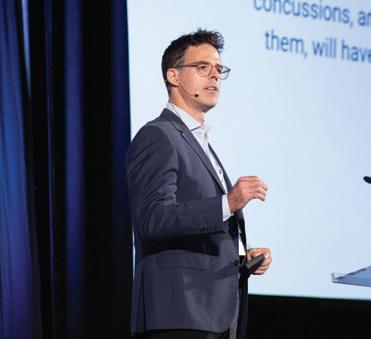
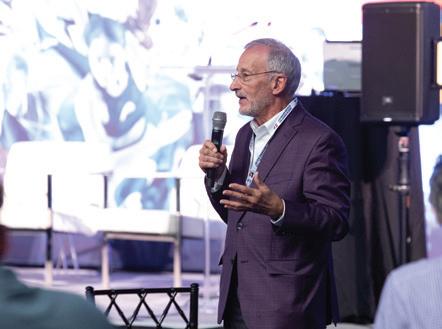
“Over the last two years, the institute has not only attracted the attention of prominent sport medicine and sport science experts now working on creative research projects funded through TISS, but also graduate students and post-doctoral fellows, whose research promises to transform the world of high performance sport,” said Tanenbaum. With plans for the next conference already underway, the 2026 event will look to build on the success of the inaugural year.
“Initiatives like this conference are tremendously important in enabling perspectives of some of the world’s leaders in sport medicine and sport science research to be shared with the high performance sports community,” said Tannenbaum.
KPE Professor Joseph Baker, TISS chair in sport science, data modelling and sport analytics, facilitated a panel discussion featuring some of the top thought leaders on young athlete development from around the world.
“Working in high performance sport has some unique challenges due to complexities involved in the business of elite sport, the complicated process of athlete development, the unpredictability of athlete performance and the social challenges of engaging people in sport at a time when rates of physical activity are alarmingly low,” said Baker. “Improving these areas will only come through thoughtful engagement across these domains, and I thought the conference did an amazing job of starting the conversations.”
Sam Robertson, director of Track Consulting Group from Australia, presented on the opportunities for high performance sport in the age of AI.
“If AI can help us improve the prescription of how we train or stop us from being injured, then it’s, of course, really valuable, but using AI also raises some ethical and legal questions – for example, who’s liable if AI makes a mistake? The reality is, we’re all going to be better off if we collaborate more on these big problems, and these kinds of gatherings offer such opportunities.”

Yannis Pitsiladis, a professor and head of the Department of Sport, Physical Education and Health at the Hong Kong Baptist University, presented on some of the big issues in sport, including doping and integrating transgender and intersex individuals into elite sport.
“Sharing research in these kinds of settings is absolutely essential,” said Pitsiladis. “We saw during COVID when we couldn’t attend conferences the impact that it had, especially on young people. The students whose poster presentations were displayed at this conference opened themselves up not only to conversations about their research – but also to potential jobs.”
Case in point: Abimbola (Abi) Eke, a post-doctoral fellow working with Associate Professor Katherine Tamminen of KPE on a collaborative project with the Centre for Addiction and Mental Health (CAMH).
“It’s been such a great opportunity for me to share the work we’ve done so far,” said Eke. “A few people came up to me to ask me about the project and how we can support their sports and clubs, including a conference participant from Malaysia.”
Professor Gretchen Kerr, dean of KPE and a member of the executive committee of TISS, said the knowledge shared and generated at this conference will be of interest not only to the research community but also to the wider high performance sport and athlete community – a sentiment echoed by Kyle Paquette, director of the National Wheelchair Curling Program.
Paquette was part of a panel discussion on the big impact of small innovations, featuring Mark Ideson, three-time Paralympic medalist and World Champion in the sport of wheelchair curling, and Mick Lizmore, head coach for the National Wheelchair Curling Program, who said that “all innovations benefit from athlete input.”
Join us at second annual TISS conference September 26-27, 2025. Watch tiss-conference.ca for details. — Jelena Damjanovic

As part of the strategic vision for the Faculty outlined in the Academic Plan launched in 2022, the scope of the vice dean of programs’ position has been expanded. The role, held by Associate Professor Ashley Stirling, now encompasses strategic and operational oversight of athletics and physical activity programs for the university student body and the wider community, alongside continuing responsibility for academic programs and services for KPE students.
“This expansion fosters additional growth opportunities to advance our strategic objectives to be one Faculty, in organizational structure and philosophy, with co-curricular programs aligning with the academic mission of U of T, and education, research and practice interconnecting in a ‘living lab’ to support our Faculty’s mission,” says Professor Gretchen Kerr, dean of KPE.
new and embedded counselling services and programs, such as KINections, a one-stop shop for all KPE students to connect and get involved beyond the classroom, and Passport to Success, designed to support international students.
“I am honoured to take on this expanded role,” says Stirling. “My focus will remain on fostering success among KPE students, student-athletes and the broad and very diverse community of 100,000 U of T students who have access to our programs, with special emphasis on holistic well-being, innovation and inclusion.”
“My focus will remain on fostering success among ... students who have access to our programs, with special emphasis on holistic well-being, innovation and inclusion.”
– Ashley Stirling
“On top of forging a successful career as researcher and academic administrator at KPE, Ashley is also a proud alumna of our Faculty and the Varsity Blues program and, as such, truly embodies the spirit of one mission, one vision, one Faculty.”
Stirling has held the position of vice dean since 2018, with responsibility for the oversight of KPE academic programs and services. During that time, she oversaw the implementation of numerous academic innovations, from the launch of the undergraduate certificates to the new Master of Sport Sciences (MSS) and Master of Kinesiology (MKin) programs.
Under her leadership, student services expanded to include
Working collaboratively across academic and athletic programs, Stirling has developed experiential programming that connects teaching, research and practice. She chaired a tri-campus working group to develop U of T’s first tri-campus undergraduate minor in global leadership, and her practical guide to work-related learning is the Higher Education Quality Council of Ontario’s most highly cited resource.
Additionally, Stirling maintains an active research program in safeguarding sport, engaging regularly with local, national and international sport organizations to advance healthy safe sport experiences.
“Collaboration is crucial to this role, and I look forward to working closely with colleagues across KPE and U of T and our partners in external organizations, as we continue to pursue our collective vision of advancing healthy living,” says Stirling. — JD
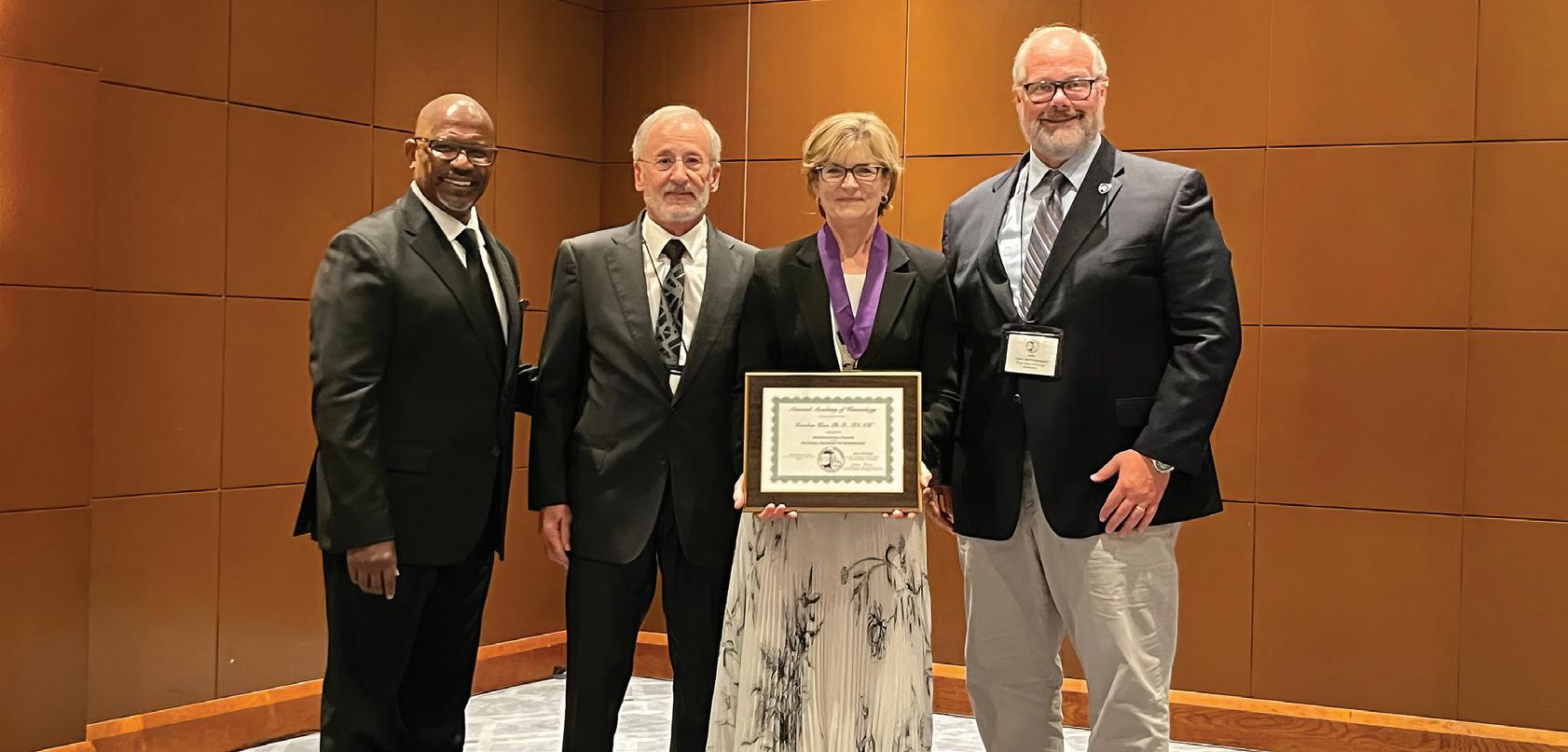
In recognition of her sustained contributions to the academic discipline of kinesiology, Dean Gretchen Kerr was inducted into the US National Academy of Kinesiology (NAK) as an international fellow.
NAK’s dual purpose is to encourage and promote the study and educational applications of the art and science of human movement and physical activity, and to honour – by election to its membership – individuals who have significantly contributed to this goal.
“I’m thrilled and honoured to be recognized for work that broadens and deepens an appreciation of the value of our field and raises the profile of the Faculty,” said Kerr on the occasion.
frequently commissioned to inform decision-makers in the high performance sports community about her research, which focuses on athletes’ experiences of maltreatment in sport and the systemic changes needed to advance safe, healthy, inclusive and welcoming sport.
She contributed to the development of the Universal Code of Conduct to Prevent and Address Maltreatment in Sport, a policy mandated by Sport Canada for all national sport organizations, and she co-authored Canada’s first national prevalence study of maltreatment among current and former national team members.
“Gretchen has a multi-decade record of excellence in generating high-impact, innovative contributions to the academic discipline of kinesiology, broadly, and to the field of sport psychology, specifically,” – Ira Jacobs
Kerr was nominated for the fellowship by Ira Jacobs, a professor at KPE, the president of the Tanenbaum Institute of Science in Sport (TISS) and himself a member of NAK.
“Gretchen has a multi-decade record of excellence in generating high-impact, innovative contributions to the academic discipline of kinesiology, broadly, and to the field of sport psychology, specifically,” said Jacobs. “While advocating for the protection of athletes from maltreatment and abusive coaching, she has inspired constructive action that protects athletes from such abuse and raises public, professional and political awareness about the issue.”
An expert on gender-based violence in sport, Kerr is
Kerr also developed education modules for the Coaching Association of Canada on safe sport and is currently engaged in a project funded by the Social Sciences and Humanities Research Council (SSHRC) to design, implement and assess an intervention program aimed at creating sport environments that realize the potential and promise of sport.
Her book, Gender-Based Violence in Children’s Sport, is widely considered to be a landmark in the field.
“The current public and political attention to athlete maltreatment of athletes by coaches was presaged by years of empirical evidence accumulated in the published research of Gretchen and her graduate students,” said Jacobs. “It was my honour and privilege to present her for induction as an international fellow in the National Academy of Kinesiology.” — JD
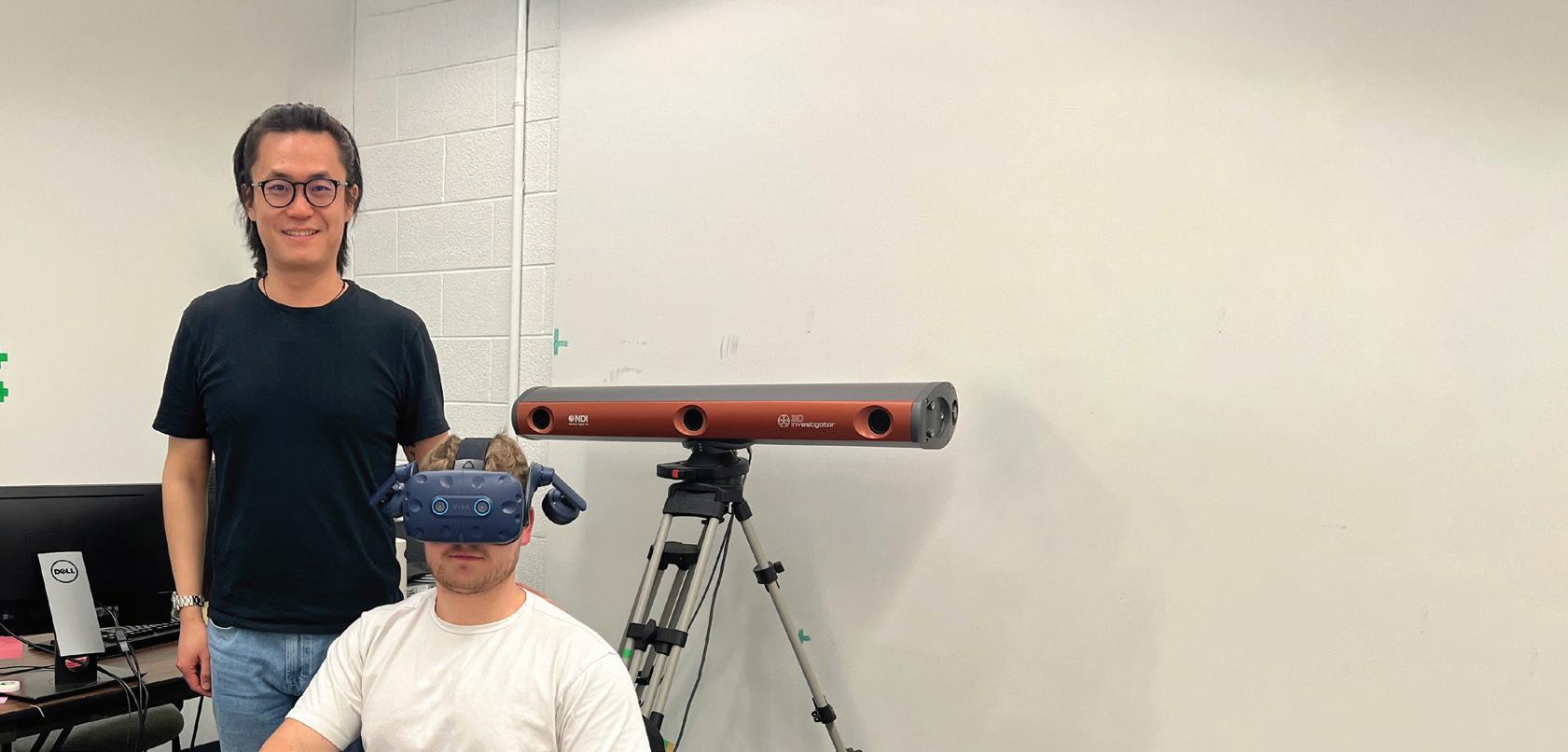
Researchers in KPE have found that using virtual and augmented reality (VR and AR) can temporarily change the way people perceive and interact with the real world – with potential implications for the growing number of industries that use these technologies for training purposes.
The study, published in the journal Scientific Reports, found not only that people move differently in VR and AR but also that these changes led to temporary errors in movement in the real world. In particular, participants who used VR tended to undershoot their targets by not reaching far enough, while those who used AR tended to overshoot their targets by reaching too far.
This effect was noticeable immediately after using VR or AR, but it gradually disappeared as participants readjusted to realworld conditions.
“Our study explored how using mixed reality (MR) technologies, like virtual reality and augmented reality, affects our ability to perform everyday physical tasks once we return to the real world,” says Xiaoye Michael Wang, a research associate at KPE who co-authored the study with Professor Tim Welsh
“Specifically, we wanted to understand if the way our brains and bodies adapt to these digital environments changes how accurately we can move and interact with real objects after using VR and AR.”
The researchers say they were surprised by two findings: first, that movement patterns in VR and AR transfer to real-world movements; and second, by how quickly the effects of AR wore off compared to VR, with study participants readjusting to real-world conditions faster after using AR.

The difference between VR and AR, they suggest, might be because people in AR can still see and interact with their actual surroundings, which helps them maintain a more accurate sense of depth and distance.
“These findings are crucial because they highlight a potential challenge in transferring skills learned in VR or AR to the real world,” says Welsh. “As more industries and training programs adopt these technologies for skill development, it’s important to understand how they might affect real-world performance.
“For example, this could be relevant for training surgeons, pilots or even everyday skills like driving. Knowing the limitations and effects of VR and AR helps ensure these technologies are used effectively and safely.”
The researchers will next be exploring how different types of VR and AR experiences, such as those involving more complex or immersive scenarios, affect real-world performance. They’re also interested in seeing how training duration and individual differences, such as prior experience with these technologies, influence adaptation and readjustment.
“This research will help us better understand how to design VR and AR systems that minimize negative after-effects and maximize their potential for training and skill development,” Wang says. — JD
Photos/ Molly Brillinger

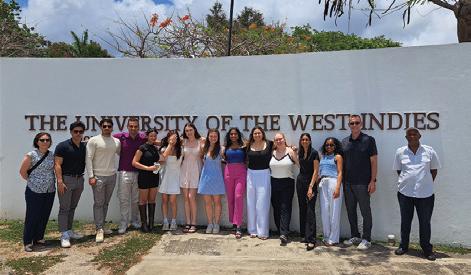

Associate Professor Simon Darnell has spent a number of years studying programs around the world that use sport to support social development and peacebuilding, particularly in places of poverty, unrest or marginalization.
In 2014, he started teaching a course designed to facilitate an informed and critical analysis of sport for development and peace (SDP) in social, institutional and practical terms.
“I’ve always wanted to incorporate an international, experiential component to the course,” says Darnell, who is also director of KPE’s Centre for Sport Policy Studies. Last summer, his wish became reality.
The course, offered by KPE in partnership with the University of the West Indies’ (UWI), Mona Campus, started with three weeks of reading, thinking and talking about SDP in the classroom in Toronto, followed by two weeks of fieldwork in Jamaica and one final week in Toronto to recap and debrief.
“The two weeks in Jamaica were effectively a combination of cultural immersion alongside participatory research into SDP,” says Darnell. “The students got to experience and discuss the same ideas that I talk about in the classroom, but with a depth and richness that I could never achieve if we were sitting in a room on the U of T campus.”
Third-year student Shaheer Farooq said the experience allowed him to witness first-hand how sport can be a powerful tool for community building and social change.
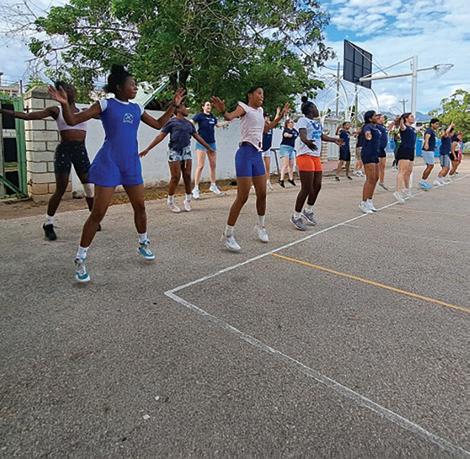
“Working with kids from the Child Resilience Project and Fight for Peace was eye-opening and humbling,” says Farooq, “and collaborating with local organizations and seeing their innovative approaches to problem-solving broadened my understanding of how to adapt strategies to different environments and needs.”
Farooq also highlighted the rich cultural experiences and bonds that were formed during the trip – between classmates, instructor, student advisors and the local community.
“This sense of camaraderie and mutual support was a testament to the power of shared experiences and the impact of immersive learning.”
Jadyn Brooks, also in her third year, said she felt a big difference in her understanding of the course material following the trip.
Like Farooq, she particularly enjoyed immersing herself in the culture, watching the track and field Grand Prix, meeting Jaydon Hibbert, who won the gold medal for Jamaica in the triple jump at the 2022 World Under-20 Championships, visiting the Bob Marley Museum and experiencing a “pretty terrifying” drive up a mountain to get to the Blue and John Crow Mountains National Park.
“This class provided more than learning. We grew together – as both friends and scholars,” says Brooks. — JD

After an illustrious 30-year career at U of T, Beth Ali retired from her position as executive director of athletics and physical activity in the summer of 2024. She leaves a legacy of positively enriching the student experience and advancing gender equity in sport participation and leadership through her roles as administrator, coach and board member.
“Beth’s extensive contributions to sport, physical activity and co-curricular activities, including equity, diversity, inclusion and belonging initiatives, have left an indelible mark on KPE, U of T and the community,” said Gretchen Kerr, dean of KPE.
“Guided by the principle of human development through sport, Beth leaves behind a legacy of impact across Ontario University Atheletics (OUA), U SPORTS and throughout the Canadian sport landscape.”
Ali’s colleagues, teammates, players, family and friends all gathered at the Goldring Centre for High Performance Sport to celebrate her career and wish her well in the next chapter of her life.
Malinda Hapuarachchi, an assistant coach for the Varsity Blues field hockey team, first met Ali when Ali recruited her to play on the team. A Level 4/5 certified coach with the National Coaching Certification Program in field hockey, Ali spent 17 years at U of T as intercollegiate manager, program manager
and head coach of Varsity Blues field hockey before taking on more senior roles.
“Under Beth’s leadership, our team had a tremendous amount of success on the field,” said Hapuarachchi. “But, for Beth, it wasn’t just about the banners – although she loved to win. Beth brought out the best in people, and, as an athlete, you knew she genuinely cared about you as an individual.”
Leslie Dal Cin crossed paths with Ali many times over the last 40 years as a student-athlete, member of provincial and national sport organizations and colleague in OUA and U SPORTS
“Beth is a tireless advocate for the value of health, physical activity, recreation and sport as an essential component of the co-curricular experiences and campus life,” said Dal Cin. “More than increasing numbers and winning titles – although she had much success in both areas – Beth cared about fostering personal growth and development and ensuring that student-athletes leave the university as well-rounded citizens.”
The Varsity Blues captured numerous conference titles and individual awards during Ali’s tenure as executive director of athletics and physical activity.

The program hosted provincial and national championships and established blossoming partnerships with NBA Canada, Canada Basketball, BioSteel and OVO Bounce.
In 2023, Ali was recognized with the inaugural OUA Woman of Distinction Award.

“Beth’s legacy of excellence, compassion and unwavering dedication ... to human development through sport will continue to inspire me and countless others for years to come,”
Linda Kiefer, assistant head coach of the celebrated Varsity Blues swim team, shared a top list of what made Ali so well liked as a person.
– Mary Beth Challoner
“She knew when to be tough and when not to be tough,” said Kiefer, who recalled the swim team’s U SPORTS championship wins in 2016 and 2024, when Ali jumped in the pool with the coaches to celebrate.
“I know Beth will be reading a lot of books over the next little while with her grandson,” said Kiefer, displaying a copy of Dr. Seuss’s Oh, the Places You’ll Go! “This is my retirement gift for Beth, and I hope that one of the places she goes to when she retires is the spa – something we’ve been planning to do for years.”
Fighting back tears, Mary Beth Challoner, director of intercollegiate athletics and high performance sport, said she felt a mix of gratitude, admiration and a touch of melancholy
reflecting on the incredible career of someone who’s had such a profound effect on her life.
Challoner recalled Ali showing up for her mother’s wake in Whitby shortly after they started working together and being deeply moved by this act of compassion and support. She described Ali’s leadership as a blend of thoughtful consideration and decisive action, which ensured objectives were met in a manner that was inclusive and respectful of everyone involved.
“Beth’s legacy of excellence, compassion and unwavering dedication to this program, to the people, to the university, but most importantly to the human development through sport will continue to inspire me and countless others for years to come,” she said.
Struggling herself to contain her tears, Ali said it was difficult to find the right words to describe her feelings in the face of so many heartfelt tributes.
“I am forever grateful to U of T for the opportunities it has provided,” said Ali. “In the end, it is all about the people, and I have been blessed to work with an outstanding group of students, staff, coaches and colleagues during my time here.”
— JD
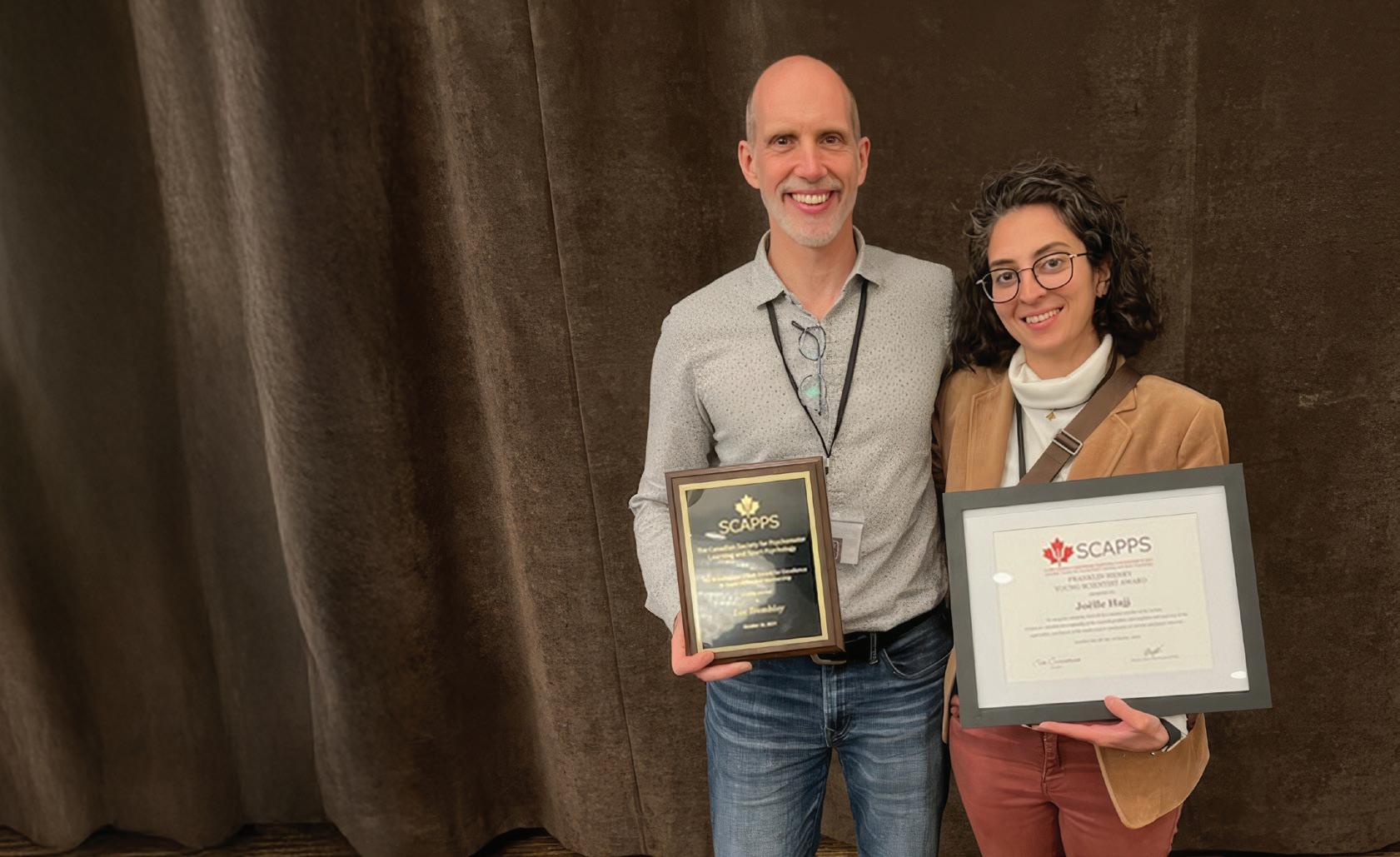
Professor Luc Tremblay was a recipient of the 2024 Brawley and Elliott Award for Excellence in Supervision and Mentorship presented by the Canadian Society for Psychomotor Learning and Sport Psychology (SCAPPS).
The award, first established in 2019, recognizes academics who have positively influenced and enhanced the career paths of their trainees, including graduate and undergraduate students, research associates, post-doctoral and early career researchers, through research training and other efforts.
“I am very grateful to the SCAPPS community and thank all of the amazing students I had and still have the chance to work with,” said Tremblay, who is director of the Centre for Motor Control at KPE. “I will endeavour to continue honouring the exceptional legacy of my own supervisors, Professors Emeriti Luc Proteau and Digby Elliott.”
SCAPPS was founded in 1977 with two objectives in mind: to promote the study of sport and exercise psychology, motor control, motor learning and motor development in Canada, and to encourage the exchange of views and scientific information in the fields related to psychomotor learning and sport psychology.
In fulfilling its objectives, the society engages in several activities, such as hosting an annual conference at which scholars are invited to present their research, and presenting
awards to outstanding mentors and trainee scholars. This year, one of Tremblay’s students, Joëlle Hajj, was one of the recipients of the Franklin Henry Young Scientist Award –further evidence of Tremblay’s impact as a mentor.
“The Brawley and Elliott Award recognizes faculty members who have demonstrated a long-standing commitment to supporting trainees in achieving their academic and career goals,” said KPE Professor Katherine Tamminen, who is past president of SCAPPS. “The awards review committee remarked upon Luc’s unwavering support for his students and his commitment to supporting diversity and equity among his trainees.
“His impact through his supervision is also notable from the achievements of his students, as three of his students have won the SCAPPS Franklin Henry Young Scientist Award in past years.
“Luc’s recognition as a mentor and his impact in the field is a testament to the outstanding research and training environment fostered within our Faculty.”
Indeed, KPE faculty members are among the past recipients of both the Franklin Henry Young Scientist Award and the Brawley and Elliott Award recognizing exceptional supervisors and mentors – a demonstration of their ongoing pursuit of excellence. — JD
Photo/ Gerome Manson
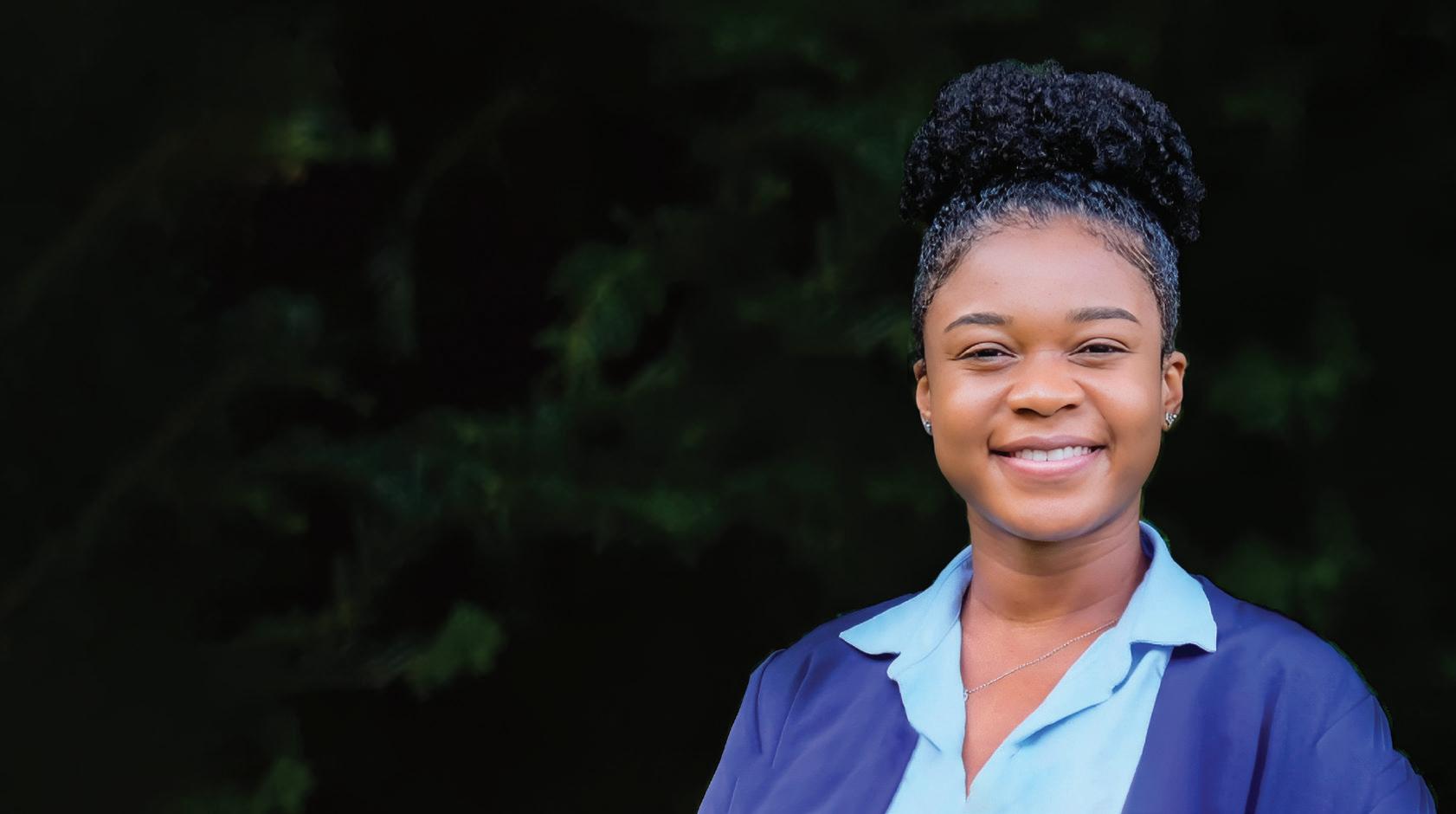
For Chelsi Ricketts, research on body image is a scholarly interest borne out of personal experiences. She participated in track, her brother is a collegiate athlete and her father was a competitive bodybuilder.
“Growing up, I was fascinated by my father’s drive and discipline in the pursuit of muscularity and my brother’s effortless prowess in the triple jump,” says Ricketts. “These experiences made me more aware of the incredible functions one’s body can perform when engaged in sport and physical activity, increasing the likelihood of developing a positive body image.”
But Ricketts knows all too well that not everybody appreciates their body’s potential in sport settings – she dropped out of sport in high school due to body image concerns. As a researcher, she now strives to promote inclusive and welcoming sport and physical activity environments for all, regardless of body shape, size or weight.
Ricketts received funding from U of T’s 2024 Provost’s Postdoctoral Fellowship Program, an annual fellowship program providing funding to support the hiring of postdoctoral fellows from under-represented groups, specifically Indigenous and/or Black researchers. She will work with Professor Catherine Sabiston to explore how sex and gender intersect with body size, shape and weight diversity to influence sport participation among Canadian girls.
“I am thrilled to join U of T’s dynamic research community, grow my scholarly profile and foster meaningful connections,”
says Ricketts. “Working with Professor Sabiston offers unparalleled training opportunities, and I look forward to immersing myself in a field of research that I am deeply passionate about.”
Sabiston notes she was aware of Ricketts’ promise as a researcher even before she applied for the Provost’s Postdoctoral Fellowship Program.
“Chelsi presented at the North American Society for the Psychology of Sport and Physical Activity annual conference [in June 2024], and after her presentation, I had many people come up to me and suggest I approach her for a post-doctoral fellowship,” says Sabiston, who holds a Canada Research Chair in Physical Activity and Mental Health. “I made a lot of sport and exercise psychology colleagues happy when I acknowledged we had already connected.
“Chelsi’s experience in global research specific to body image and sport performance and participation and her expertise in cross-cultural research and partnerships will be valuable for helping me lead specific research aims within the SSHRC Partnership Grant–funded Rethink Sport Project.”
As for Ricketts, she says she is grateful to Sabiston and KPE for the opportunity.
“Collaborating with scholars who share my research interests is invigorating,” she says. “This is especially significant to me as a woman of Afro-Caribbean descent, a group historically underrepresented in scholarly discourse.” — JD
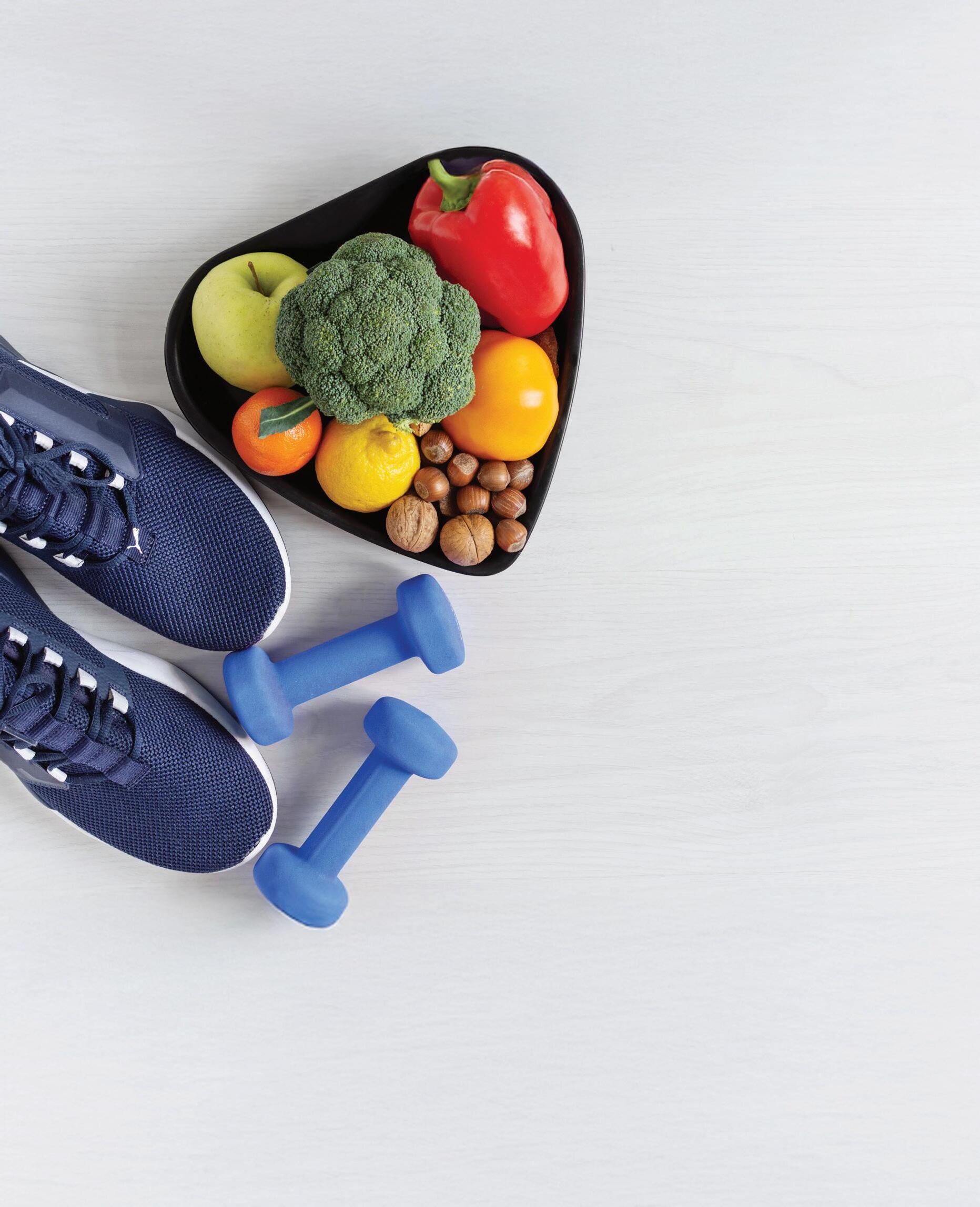
Agroup of KPE researchers came together earlier in the year to discuss the role that exercise and nutrition can play in cancer prevention, care and recovery. The interactive online panel discussion was part of KPE’s Science Café series featuring KPE faculty experts on a variety of topics.
“The good news is that people are living longer after a cancer diagnosis,” said Associate Professor Linda Trinh, who specializes in physical activity and sedentary behaviour interventions for cancer control and survivorship. “The challenge is to provide them with the support and care to self-manage some of the acute and late-appearing cancerrelated side-effects.”
The researchers shared that there is strong evidence that exercise can reduce the risk of some types of cancers, as well as improve cancer-related symptoms after a cancer diagnosis. They also affirmed that healthy eating is a cornerstone of lifestylerelated prevention of chronic diseases, including cancer, cardiovascular disease and type 2 diabetes. — JD
Below, we summarize some of the recommendations that came out of the discussion, which, in addition to Linda Trinh, also included Assistant Professor Amy Kirkham, specializing in cardiovascular health, Associate Professor Daniel Santa Mina, focusing on pre-surgery exercise interventions, a.k.a. prehabilitation, and Professor Catherine Sabiston, Canada Research Chair in Physical Activity and Mental Health.
Eat fruits and vegetables, leafy greens and whole grains; minimize red meat and processed food intake, including sugar.
Have grace with yourself: if chemotherapy is making your salad taste awful, you can make accommodations.
The same is true of exercise. While everyone should strive towards 150 minutes of moderate-to-vigorousintensity exercise per week for overall health, cancer-specific exercise guidelines suggest 90 minutes of moderate-to-vigorous-intensity exercise – and you don’t need to go to the gym.
Exercise is safe and helpful, and cancer survivors should be moving as much as they can tolerate; it all adds up, and any minute that you’re active counts.
Walk, do light biking or dance for aerobic exercise and use your body weight for strength training – for example, chair sit-to-stands and wall push-ups.
Practice self-care and selfcompassion; this applies to patients and their caregivers. Take small steps and celebrate each one.
Be mindful of the time of day, consider when you may be most tired or in pain from treatments and don’t compare yourself to others. Be kind and flexible with yourself.
Make exercise become part of a routine; set up short- and longterm goals, anticipate barriers and plan around them.
If you’re making physical activity or dietary changes, you will be more successful if someone else – your partner, sister, son or friend – is making these changes with you.
One size does not fit all; adapt your exercise routine to your particular circumstances.
“Cancer patients shouldn’t just be surviving, exercise and nutrition can improve their quality of life – from the time they are diagnosed, all through treatment and after.”
— Daniel Santa Mina


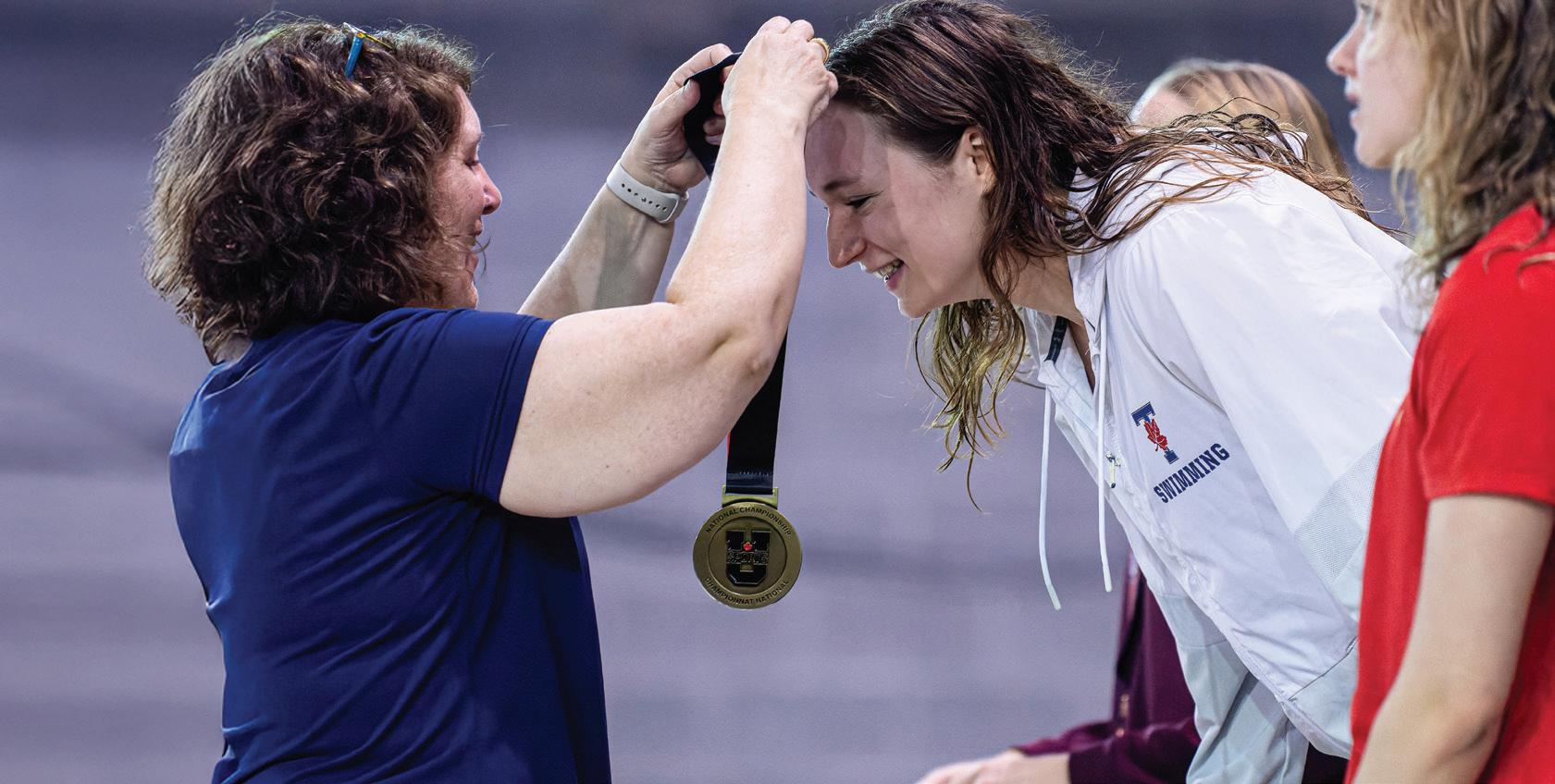
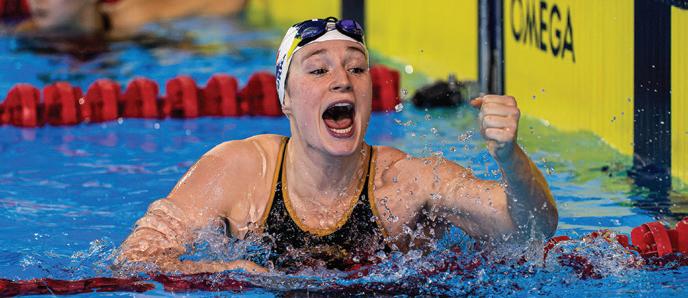
Uof T swimming star Ainsley McMurray was celebrated by U SPORTS in January when she was selected as one of the Top 8 Academic All-Canadians for the 2023–24 season.
McMurray, who hails from Montreal, graduated last year with an MA in Environmental Sciences. During her time at U of T, she maintained an A average while leading the Varsity Blues swim team to national prominence. A three-time U SPORTS freestyle champion, she was named the 2024 OUA Female Swimmer of the Year and played a pivotal role in the Varsity Blues’ three consecutive national team titles. She also achieved career-best performances at the 2024 Olympic trials. She has won 10 individual gold medals as a Varsity Blue and competed for Canada at the 2019 FISU World University Games in Naples, where she won a bronze medal, and at the 2018 Junior Pan Pacific Championships in Fiji, where she won two silver medals and one bronze.
McMurray was selected for this honour from among 4,900 studentathletes who achieved Academic All-Canadian status in the 2023–24 season. “This is an award that recognizes what I’ve always strived for: balance,” she said at the presentation ceremony for the Governor General’s Medal for Academic Excellence in Ottawa earlier this winter. She thanked her parents for raising her to value athletics, academics and the arts equally – and celebrated her role models at U of T who did the same. “These women showed me how I wanted to present myself in academics, athletics and professionally,” she said.
Speaking at the event, U of T Director of Intercollegiate Athletics and High Performance Sport Mary Beth Challoner emphasized McMurray’s accomplishments. “She epitomizes the student-athlete,” Challoner said. “You have raised a fantastic human being,” she added, addressing McMurray’s parents. “She is an ambassador and an advocate for all that is personified in a student-athlete when she trusts in her coaches, and she trusts in her program – and she lives it every day.”
B eyond the pool, McMurray’s commitment to environmental advocacy recently led her to accept a position with Deloitte Canada’s sustainability reporting practice.
“I want to thank U of T for making this possible for me,” said McMurray, who is the 11th Varsity Blue to be honoured with this award since its inception in 1988. “I’m proud to represent all female OUA Academic-All Canadians as a U SPORT Top 8 All-Canadian – the highest honour,” she added. — Michael Strizic
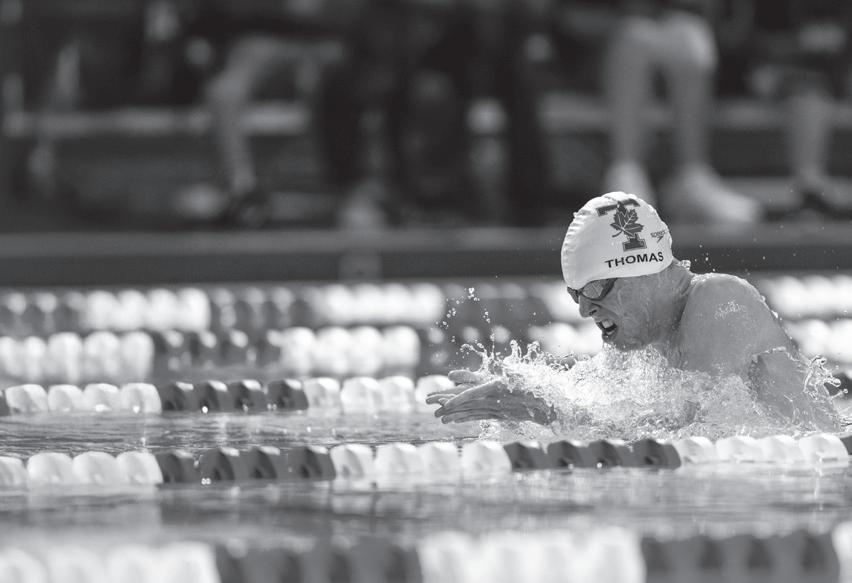
Competing in front of sold-out crowds all three nights, the Varsity Blues men’s swimming team earned the national silver medal, while Toronto’s women placed fourth. The Blues reached the podium 24 times over the three-day meet, highlighted by 2023–24 U of T T-Holders’ Female Athlete of the Year Nina Mollin, who won three individual national titles in the 200m individual medley and the 100m and 200m butterfly events.
Additionally, first-year swimming sensation Nathan Thomas was named the U SPORTS Men’s Rookie of the Year after claiming two silver medals and one bronze.
— Jill Clark
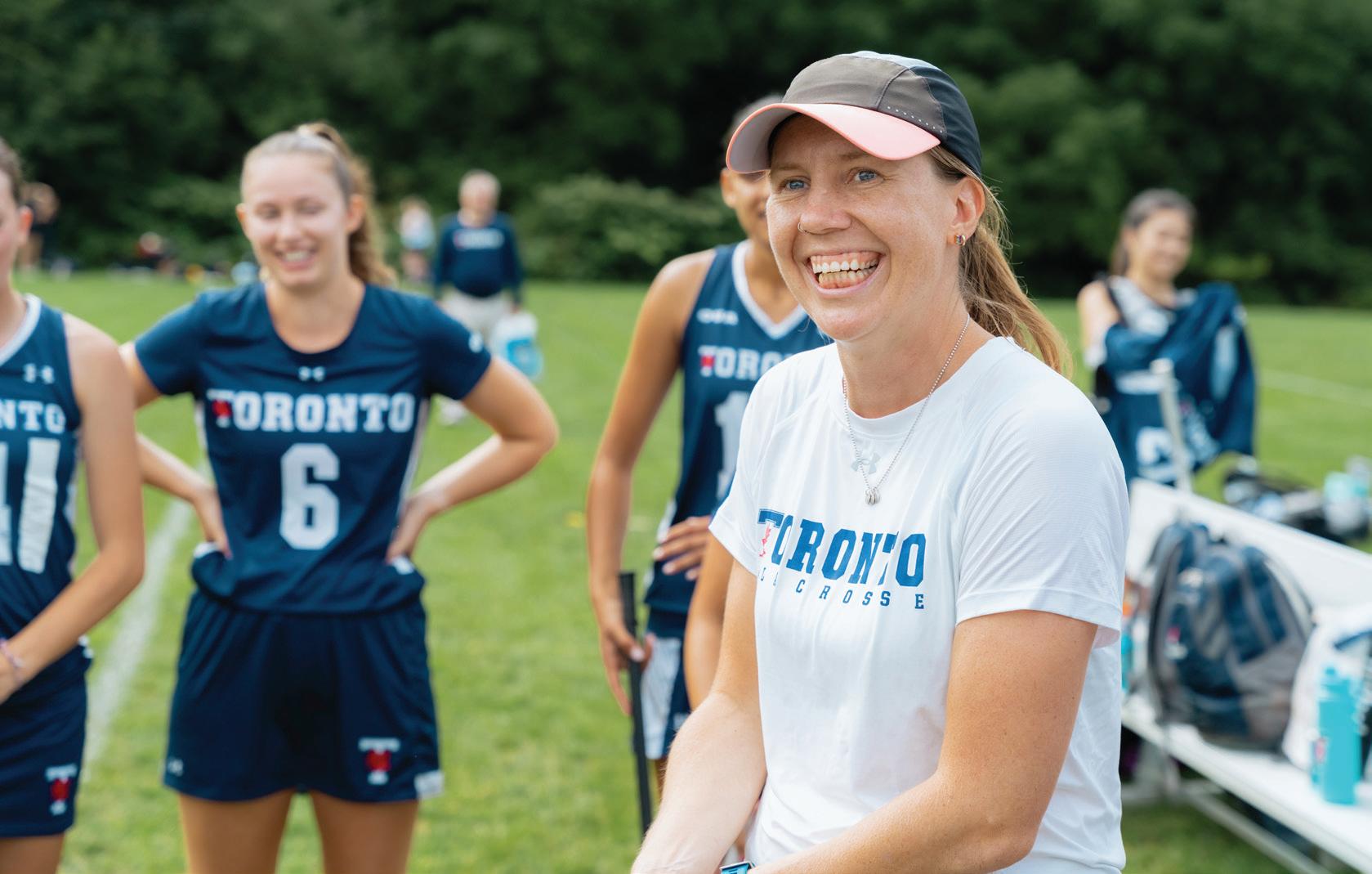
With a lacrosse stick in her hands and a smile in her eyes, Jesse Porter is redefining what it means to be a coach and scholar in the world of sport.
As coach of the Varsity Blues women’s lacrosse team, she was named 2024 OUA Coach of the Year. Before that, she led the Chinese women’s lacrosse team to their first World Cup competition. Though they didn’t win a single game, Porter proudly recalls the thrill of that experience. She loves the players and the game.
Growing up, Porter played many sports but settled on lacrosse as an undergrad and played for the OUA champion Western Mustangs. She served as a coach and official at various clubs and leagues and eventually found herself in Shanghai, coaching China’s first-ever national women’s lacrosse team.
In 2019, returning to Toronto, she became head coach of the Varsity Blues women’s lacrosse team. She had no plans to continue her education, but something about the contrast between the Chinese and North American attitudes and approaches to sport intrigued her. She found herself wanting to understand more about the sport system.
“ There’s this tension I’ve experienced as a coach – you’re expected to be a strict, serious leader, but also nurturing
Photos/ Terrance Tong
and caring,” says Porter. “I wanted to understand how those dynamics play out and how we can do better.”
Looking for answers to these questions, Porter often asked her players to send her books and articles from U of T’s libraries. As her interest mounted, she enrolled in a master’s program at Brock University, where her research focused on the emotional labour of women coaches.
Now in her PhD at U of T, Porter has found her calling in the university’s Safe Sport Lab. Her work under Professor Gretchen Kerr examines the gendered nature of efforts to protect athletes from maltreatment and violence and optimize their sport experience. Through research and policy analysis, she seeks to understand how this work falls across gender lines.
As a coach, Porter tries to ensure that sport is a joyful and inclusive experience. She recognizes that varsity players have many competing priorities, and lacrosse can’t always be at the top of the list.
“ There’s this ‘win at all costs’ culture in sport, and I don’t think it has to be that way. There are other ways we can enjoy sport,” says Porter. “And we need to remember that not everyone has equal access to sport spaces.” — Catharine Heddle
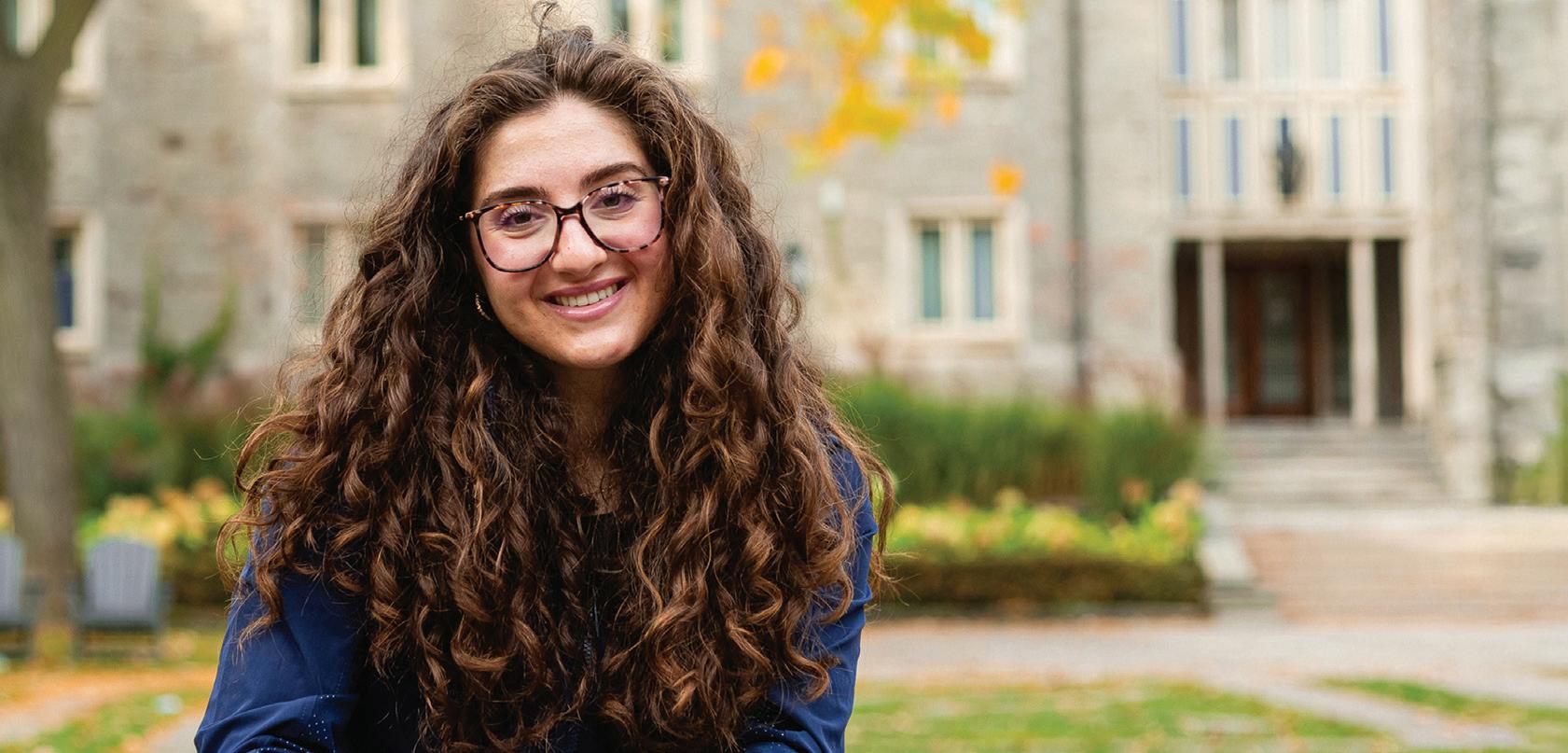

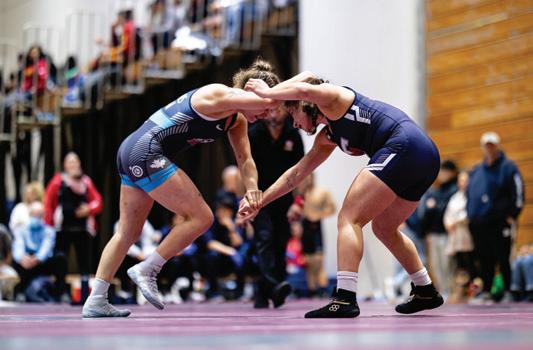
Achild of immigrants and a first-generation university student in Canada, Varsity Blues wrestler Maya Salman has found a way to excel in the ethics, society and law program at the University of Toronto.
“Making it to U of T was not a linear path,” says Salman. “I, like many of my counterparts, struggled academically as many of our parents, including my own, did not attend elementary school, high school, or university in Canada. This became particularly problematic when applying for university, as no one in my family had gone through that process before me. With my lack of knowledge of what university would entail, starting my undergraduate degree at U of T was unbelievably daunting.”
Undeterred, Salman committed herself to working hard and finding a way to make it all work. She earned her place at U of T, and then, after a year of rigorous academics, was admitted to the ethics, society and law program with the top GPA of her entry class.
“Balancing work, school, and wrestling is one of the hardest things I have had to do,” says Salman. “It is in those moments that discipline – doing something not because you want to, but because you are committed to it – became critical for me.”
That commitment was rewarded with U SPORTS Academic All-Canadian honours following the 2023–24 season. Along with her studies and wrestling for the Varsity Blues, Salman has also been involved with the Middle Eastern Students’ Association (MESA), becoming a peer mentor for first-year students within the ethics, society and law program.
“The U of T college system was a huge factor in my decision to attend school here,” says Salman. “Being part of a smaller community at Trinity College made the transition, especially as a first-generation student, so much easier, and then joining the wrestling team in my second year just enhanced that sense of community even more. My teammates have become my family.”
Salman, who began her second season with the Varsity Blues wrestling team in November 2024, hopes to pursue law school and explore Indigenous and international law.
“I have witnessed the effects of an ineffective international legal system that has failed to protect so many groups around the world, including my own family,” says Salman. “I would love to pursue a career that allows me to rectify some of these injustices and fortify international law. Indigenous studies have also enhanced my understanding of justice and Indigenous issues enormously. This has inspired my dream of hopefully working on repatriation efforts for displaced Indigenous peoples everywhere in the world.” — Jordon Hall

After breaking his neck and facing an uncertain future, Varsity Blues football player Koby Lee forged an inspiring comeback. Originally from New York, Lee came to U of T in 2019 as an international student, studying engineering while pursuing football.
His first year turned out to be a humbling experience. Not only was the engineering curriculum particularly demanding, but as an undersized athlete he would need to prove himself to a new coaching staff as a walk-on.
“I think that most students have a period where they adjust to the increased demands of being a student-athlete at the university level,” says Lee. “The great thing for me was being part of two tight-knit communities on campus – the international students at Chestnut and my brothers on the football team.”
In 2021, adversity struck in a way no one could have predicted. In his first season as a starting defensive back, Lee suffered a concussion and serious neck injury that put his future on hold. The months that followed were filled with uncertainty – not only about his athletic career but also about his ability to graduate on time.
“I don’t know how much of that time I clearly remember,” says Lee, “but I do remember feeling an immense sense of gratitude,
especially for the medical support staff at U of T and for all of the love and support that everyone in my life was giving me.”
Lee’s recovery came faster than anticipated, and he was given the green light to return to football, with no added risk of injury. This time, he set his sights on achieving Academic All-Canadian status, a personal goal he had held since his first year. Not only did he earn his All-Canadian honours, but he was also admitted into the Rotman School of Management MBA program, allowing him to suit up for the Blues for another season.
“The fact that I can now pursue my entrepreneurial aspirations and still be able to continue my football journey as a Varsity Blue is more than I could ever have asked for,” says Lee, whose personal experience with injury and recovery has inspired him to make a difference in the community.
Through his clothing business, Forget What People Think, he he launched a fundraiser hoodie to provide young adults in Toronto with access to free mental health therapy.
“During the recovery from my injury, it sometimes felt like the world was moving along without me, and I remember how isolating that was,” says Lee. “It’s for these reasons that I aspire to use my entrepreneurial platform to empower others and inclusively amplify their voices.”

By Jelena Damjanovic
Assistant Professor Amy Kirkham was reading a historical review of the research informing the prevention of heart disease when she was struck with an idea for an ambitious new study.
“The review outlined how the basis for using strategies such as medications and lifestyle changes, including diet and physical activity, to help prevent heart disease stemmed from two major studies based entirely on men,” says Kirkham, whose research is focused on developing evidence-based lifestyle interventions to prevent and improve cardiovascular dysfunction and disease, specifically in women.
The Multiple Risk Factor Intervention Trial, aptly named MRFIT, begun in 1972, and the Physicians’ Health Study, begun in 1982, included approximately 12,000 and 22,000 middle-aged men, respectively. These large-scale studies evaluated the effectiveness of prevention and treatment strategies for heart disease. However, the applicability of the results of these major studies to women raised public concerns about the historical exclusion of women from this type of research.
“The review posed the question of how it is possible that studies of heart disease, a condition known to be the most common cause of death in women, relied solely on male participants?” says Kirkham. “As I was reading this, I felt a fire light under my feet.
“I’m pretty sure I wrote an email to Jenna Gillen right after that to say, ‘we need to do a Ms. FIT study for women!’”
Gillen, an assistant professor in KPE focusing on exercise physiology, didn’t need any convincing.
“If you look at the landmark studies in muscle physiology that explore responses to exercise, you’ll find that most were conducted in young, healthy males,” Gillen says, “and the reason for not including women in these studies has historically been that women are more complicated to study – among other things, because their hormones change throughout the menstrual cycle, so it’s just easier to study males.
“That got me thinking, rather than it being a challenge or a barrier, isn’t this a good topic for research? How does the menstrual cycle affect muscle physiology and what happens during menopause?”
Gillen and Kirkham agreed to join forces on a research project that would measure, for the first time, the impact of following Canada’s physical activity and dietary guidelines on the cardiovascular and metabolic health of pre- and post-menopausal women. True to form, they named the study Ms. FIT.
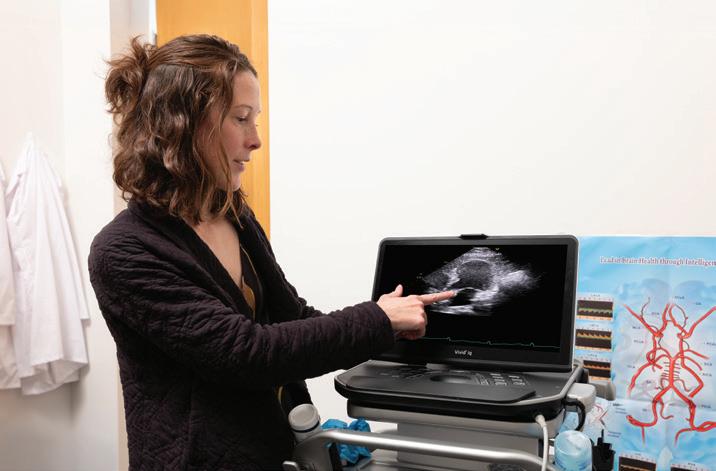
“Women are not small men. We have different biology and unique needs, so, at minimum, we need new evidence that is specific to women to inform what we’re telling them to do.”
– Amy Kirkham, assistant professor
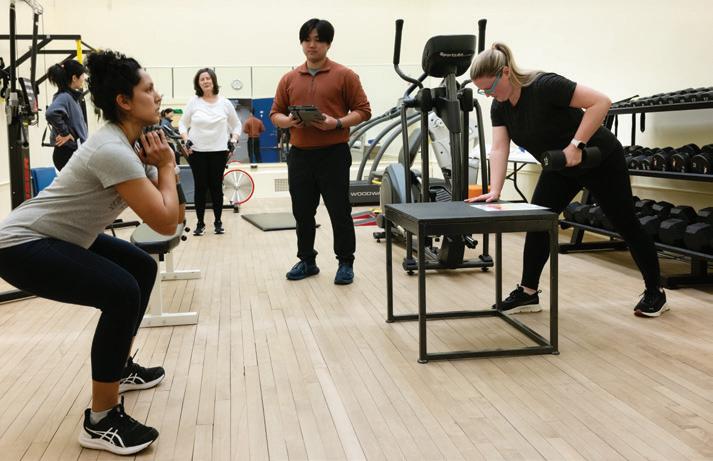

“Health Canada recommends that all adults follow Canada’s food and physical activity guidelines to help prevent and treat chronic disease,” says Kirkham, “but since most of the research that’s informed these guidelines has been done primarily in men, we don’t actually know whether these are the best guidelines to improve women’s health broadly.
“We also know that women experience different life stages, including pregnancy and postpartum, and pre- to peri- to post-menopause, but without knowing if the existing guidelines are good in general for women, it’s hard to know how they apply to all these different life stages specifically.”
To this end, Ms. FIT also includes a sub-study focusing on women with a history of breast cancer, a condition affecting more than two per cent of the female population in Canada.
“Women are not small men,” says Kirkham. “We have different biology and unique needs, so, at minimum, we need new evidence that is specific to women to inform what we’re telling them to do.”
The researchers plan to recruit 90 pre-menopausal and 90 postmenopausal women for the study, making it the largest study of its kind. It’s also one of only a few studies in women – or men – to measure the impact of physical activity and food guidelines on such a breadth of biological systems, all in one study under one roof in the research labs housed in the Goldring Centre for High Performance Sport.
“We’re looking at the impact of these guidelines on women’s hearts, blood vessels, skeletal muscle and adipose tissue [body fat] in order to understand where in that chain women experience the most health benefits and whether this differs with menopausal status,” says Kirkham.
The researchers say existing evidence shows that a lot of the expected health benefits with exercise are blunted or do not occur in postmenopausal women. For example, aerobic exercise is expected to make the heart grow stronger, however researchers have observed limited positive changes to the heart in pre-menopausal women and almost none in post-menopausal women compared to men.
“So, one of the main things that we expect to occur with exercise is not occurring in women,” says Kirkham.
A meta-analysis that looked at results from many different studies investigating the impact of exercise on heart health in male and female participants also found that the effects of aging have a bigger impact on women, in terms of how their hearts respond to training.
There are also differences in how the muscles adapt to exercise, although limited studies exist that focus on muscle physiology in females specifically.
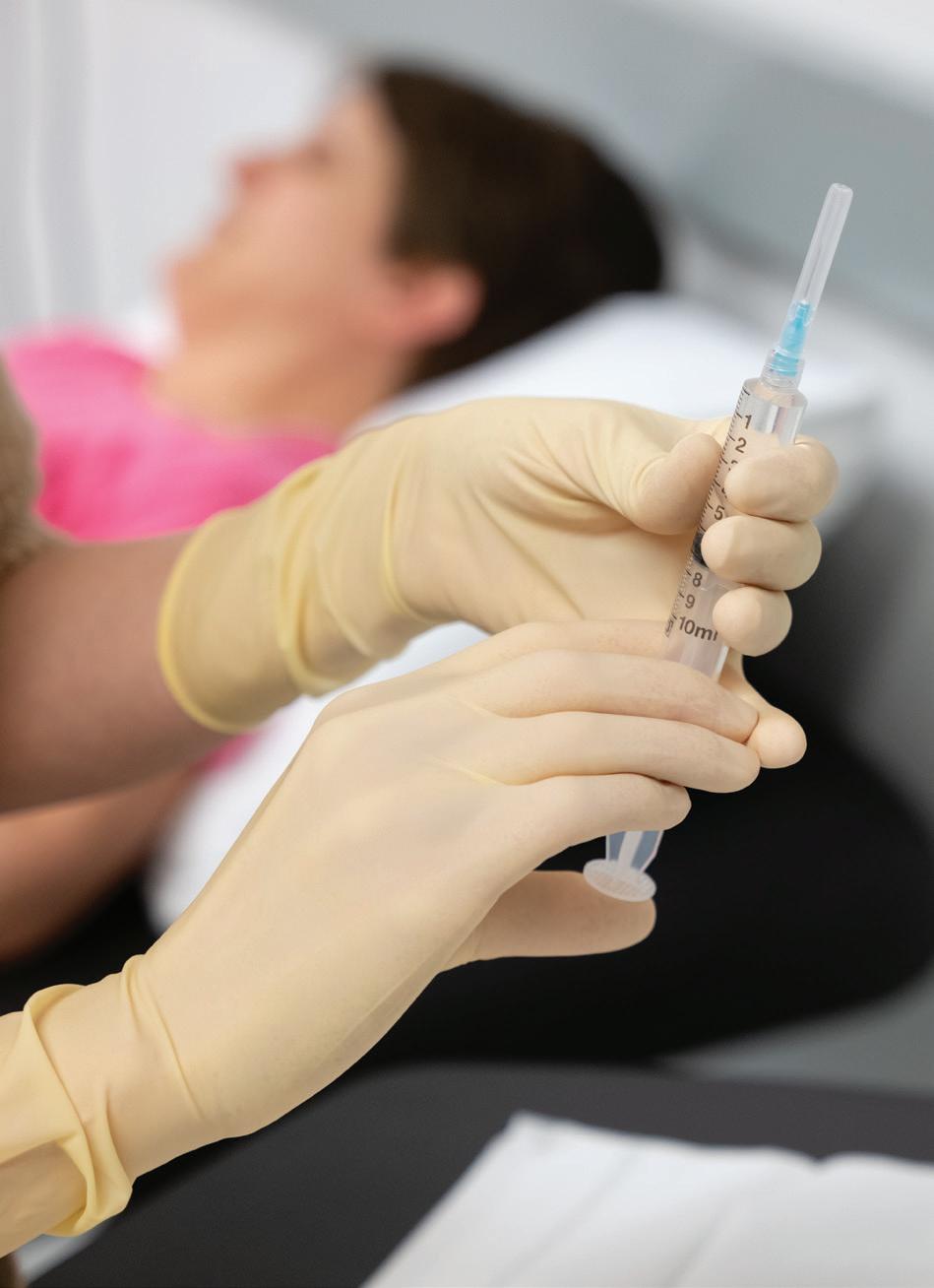
“We don’t have a meta-analysis that would demonstrate so profoundly the differences between males and females, but we do know some aspects of metabolism differ,” says Gillen. “For example, females burn different fuels than males during exercise. While males tend to burn carbohydrates, females burn more fats or lipids for fuel, which can affect their responses to exercise.”
The researchers will take thigh muscle biopsies in about half of the study participants, which is far more than most muscle physiology studies, according to Gillen, who says typically these studies have sample sizes of 10 or less per studied group. In part, she explains, that’s because of the invasive nature of muscle biopsies, as well as the cost that comes with all the consumables required for the molecular analysis.
Enter Daniel Moore, a professor in KPE specializing in muscle physiology, who’s been making his own contributions to address the imbalances in the study of women’s health by researching, among other things, the differences in protein
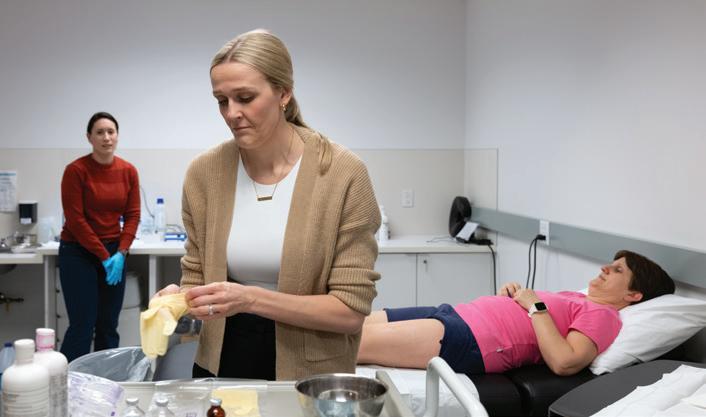
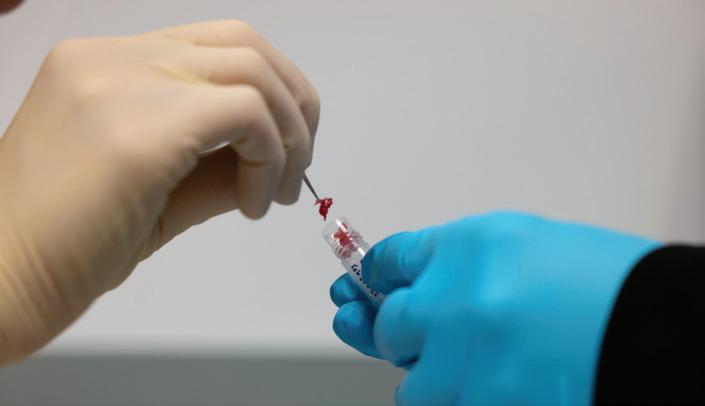
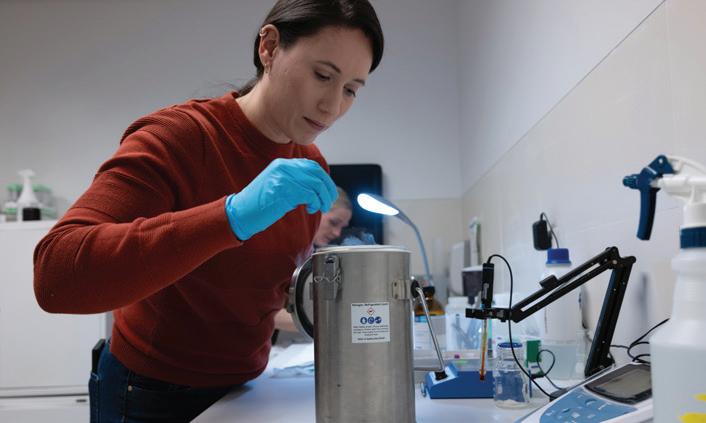
requirements between male and female endurance athletes. Moore volunteered to perform the muscle biopsies for the Ms. FIT study and simultaneously trained Gillen to start doing them as well.
Professor Catherine Sabiston has also offered to help, giving Gillen and Kirkham the use of her Mental Health and Physical Activity Research Centre (MPARC) for exercise training sessions that are part of the study.
Having the support of full professors has been helpful and encouraging, say Gillen and Kirkham, who are leading this study with contributions from two other early career faculty members, Associate Professor Linda Trinh, who specializes in exercise oncology, and Assistant Professor Robert Bentley, who has expertise in cardiovascular physiology.
Trinh is a co-investigator on the project, lending her expertise in behaviour change to the development of remote exercise and education sessions in the Ms. FIT study.
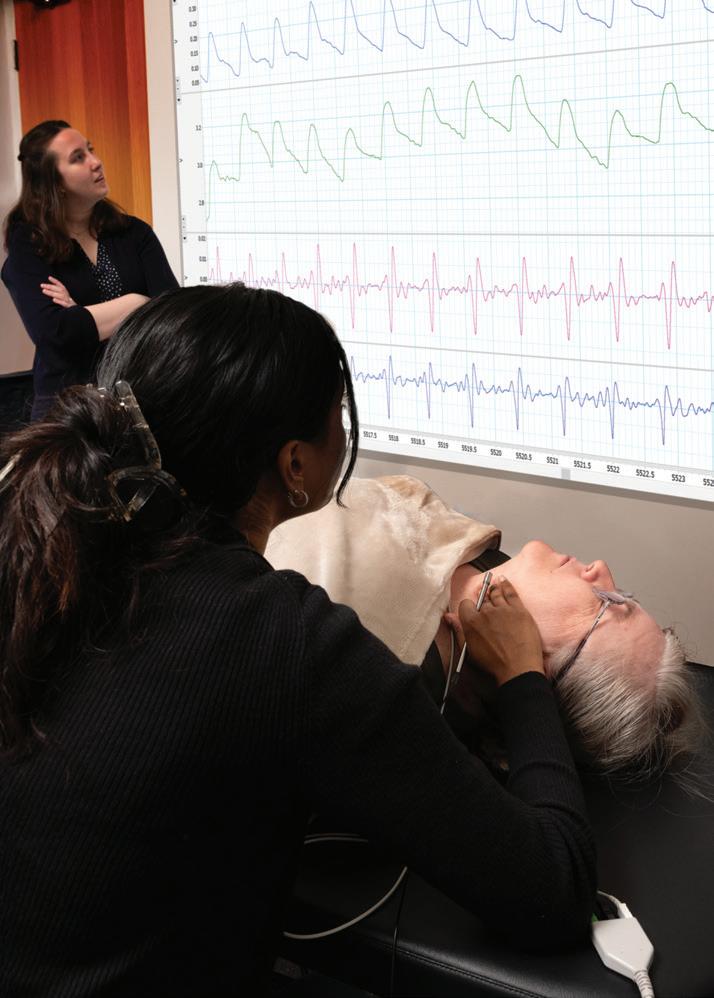
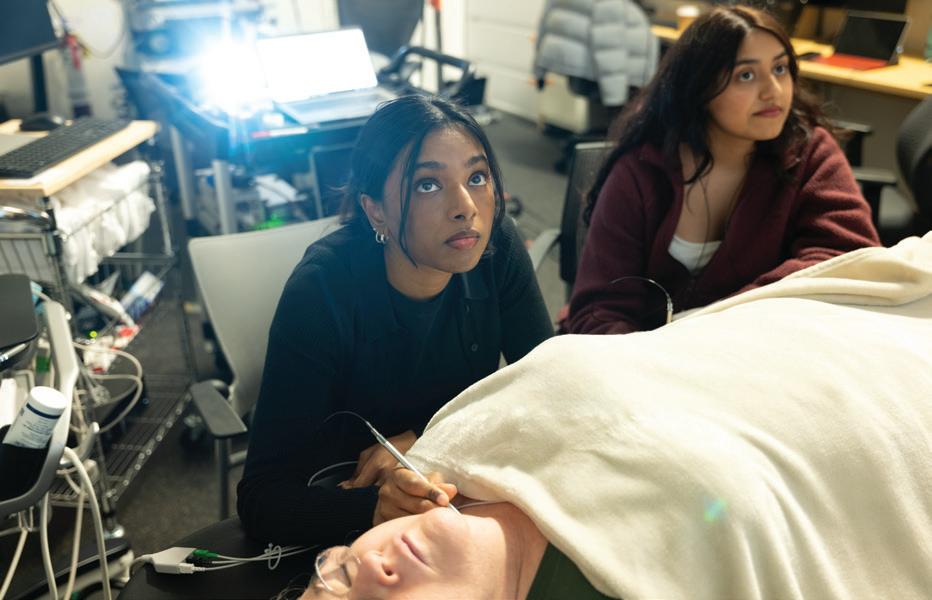

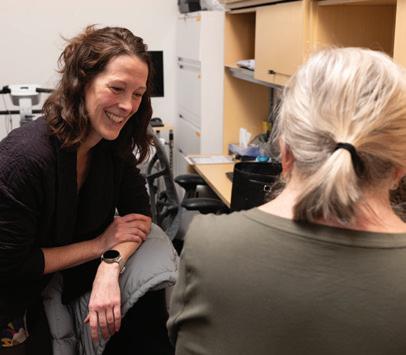
Trinh’s graduate student is working as a trainer for these exercise sessions, some of which take place in her exercise oncology lab, and has made the study’s evaluations of the barriers and facilitators to exercise the basis of her master’s thesis.
Bentley has been supporting the study by contributing his expertise in cardiac and vascular assessments and sharing equipment necessary for the project. His graduate student is also working as a paid trainer for the study.
With nearly half of the 180 study participants already recruited, the researchers are busy with data collection. They’re working on three fronts at the moment: conducting initial testing of new study recruits to analyze their hearts, vessels and muscles at baseline; following a group of participants who have started the six-month-long intervention; and doing assessments of the study participants who have completed the intervention to identify any changes to their cardiometabolic systems.
They estimate the data will take around two and a half years to collect, taking them to the end of 2026.
“We hope the information we generate will inform new guidelines, but also lead to other important outcomes, such as the development of the first-ever women-specific exercise physiology textbook – and course,” says Kirkham. “Wouldn’t it be impactful if our Faculty was leading the world in that area?”
Kirkham and Gillen are also very proud of their focus on training the next generation of scientists in women’s physiology, with so many KPE students, post-doctoral fellows and staff working on the study.
Alfred Min, a first-year PhD student in KPE, joined Kirkham’s lab as a master’s student interested in exercise interventions for improving physiological outcomes. He worked on a precursor to Ms. FIT – a six-week condensed version of the study. That work recommended him for the position of lead exercise trainer in the Ms. FIT study today.
“This has been a unique learning experience,” says Min. “Interacting with study participants has allowed me to observe how regular exercise improves various physiological health outcomes while positively impacting the study participants’ lives.”
Ms. FIT is funded by a close to $1M grant from the Canadian Institutes of Health Research (CIHR), one of the biggest CIHR grants in KPE history. Kirkham and Gillen also recently received funding from the Canadian Foundation for Innovation (CFI) for infrastructure and equipment for their new lab, which they’re calling the Centre for Cardiometabolic Oncology, Diet and Exercise Research in Women (CODE-W).
CODE-W will tackle critical gaps in women’s health by generating new knowledge that will inform prescriptions for
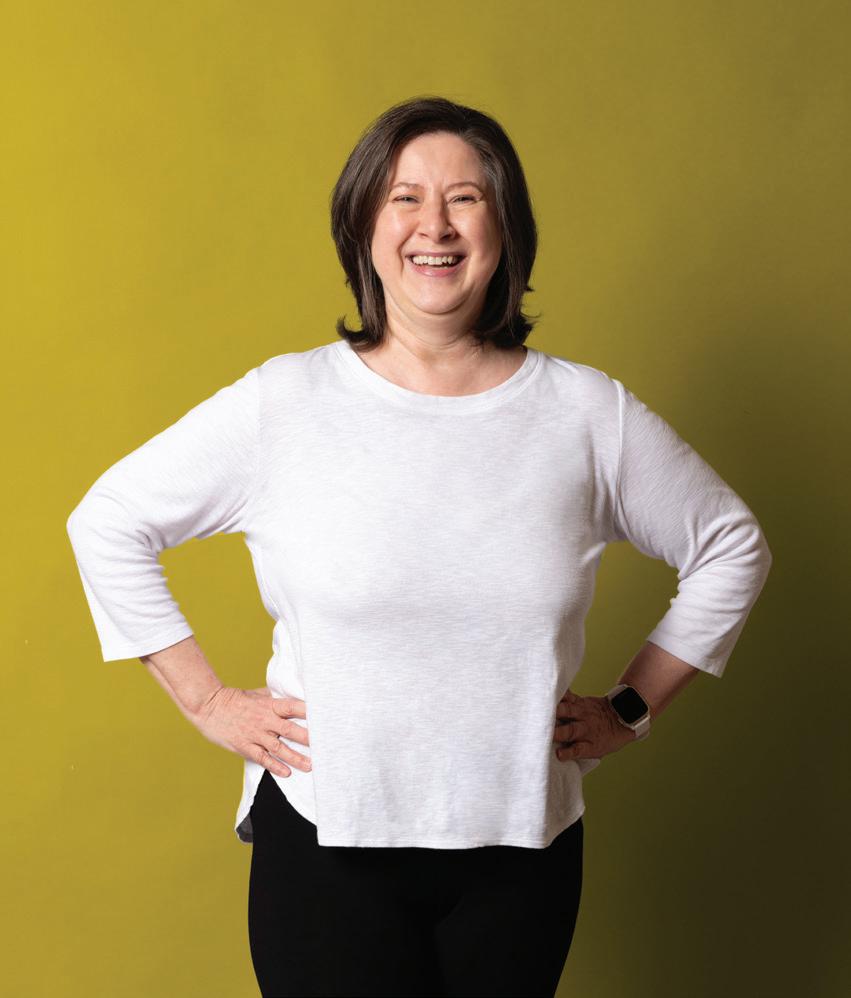
“Another reason women aren’t studied is because they are harder to test; their muscles, veins and hearts are smaller, so data collection is often more difficult.”
– Jenna Gillen, assistant professor

physical activity and nutrition interventions for the prevention and treatment of cancer, cardiovascular disease and type 2 diabetes in women. It will also provide a training environment that will empower the next generation of scientists and clinicians working on women-centred research.
Kirkham and Gillen are also eager to highlight the support they were provided by Professor Gretchen Kerr, dean of KPE, for their work.
“She understands the challenges that come with being a woman in science trying to run a research lab and conduct studies with women participants,” says Gillen.
With Kerr’s support, the researchers were able to hire a phlebotomist, who’s now working part-time in the Faculty to help with blood draws in women, who generally tend to have smaller veins.
“That’s another reason why women aren’t studied, because they are harder to test; their muscles, veins and hearts are smaller, so data collection is often more difficult,” says Gillen.
Women also have other unique barriers to participation in research, including limited availability because they generally take on more house care and caregiving responsibilities.
“The Ms. FIT study, and all other research projects conducted under the umbrella of CODE-W, are very intentional about removing barriers that have historically limited the participation of women in research,” says Kirkham.
Study participants are offered flexible schedules, financial support for time off work and child or elder care, female study staff and remote participation to help them balance their busy lives.
“In turn, our participants have been excited to be part of this historic research that has the potential to change what we know about women’s exercise physiology and chronic disease prevention in women,” says Kirkham. “This research would not be possible without them, and we are so grateful for their participation.”

As a Varsity Blues basketball player in 2003–04, Nikki Doucet little imagined she would one day lead the women’s professional football leagues in England.
But there were signs that her career might eventually involve the business of sport. In her application to Rotman’s Master of Business Administration program, she wrote about wanting to use her MBA to build a Canadian professional women’s basketball league for Canada.
Now, 23 years later, she’s living out that dream –in a different country and for a different sport.
“I saw women’s football as something that belongs to the public. Taking it to the next level is hugely exciting and a massive responsibility.” – Nikki Doucet
Originally from Nova Scotia, Doucet did an undergraduate degree at St. Francis Xavier. Armed with a Bachelor of Business Management, she moved to Toronto with a couple of suitcases, few acquaintances and the ambition to try out for the women’s national basketball team. She didn’t make the team, but she did find a job in investment banking and later enrolled in the MBA program at Rotman.
After her time at U of T and several more years in investment banking, Doucet decided she wanted to build a business instead of just advising and doing deals. Drawing on her background in sports, she joined Nike, where she worked in the women’s business, first in North America and then in England. She came to understand the English football culture (known as soccer in North America) and its female consumers while leading the company’s strategy for the 2019 FIFA Women’s World Cup in France.
So, it was natural to become involved in the plan to create a new, independent body to lead women’s professional football in England. She joined Women’s Professional Leagues Limited (WPLL) before it even had a name, working as a consultant and eventually becoming CEO.
“I had a strong point of view from a commercial perspective and also an understanding of the consumer, the fanbase and the leagues,” she explains. “I saw women’s football as something that belongs to the public. Taking it to the next level is hugely exciting and a massive responsibility.”
A spin-off from the Football Association (FA), WPLL is jointly owned by the football clubs in England’s top two women’s professional leagues. Creating it
was the most complicated mergers and acquisitions (M&A) transaction Doucet has ever worked on.
“We needed the FA and 23 football clubs with widely different ownership structures and financial resources to sign the same legal documents,” she recalls. “We succeeded because we all aligned on the same purpose: to leverage the power of women’s football to inspire a more equitable society.”
A decade from now, Doucet envisions full stadiums with star athletes and professional coaches playing games of consequence. She hopes the sport’s success will spark global advancements in sport science for female athletes, including family planning, physiotherapy and how to return to peak performance after childbirth.
“This is about more than just a game,” insists Doucet. “Women’s football was banned in England for 50 years. Now we have the chance to do something aspirational. This is about women athletes becoming role models for young girls. We’re on a journey to transform the sport and make WPLL the most distinctive, competitive and entertaining women’s football club competition in the world. And that starts by building a game that feels great for everyone.”
To achieve this, Doucet is building a diverse and inclusive team, drawing on her own experiences as a female leader in male-dominated industries. She recognizes that one cannot simply apply the structures and mindsets of men’s football to the women’s game. Instead, she makes decisions through the lens of what’s best for female athletes and their fans.
“There’s a real opportunity in women’s sport, which often sees twice the engagement compared to men’s,” says Doucet.
She applies a start-up mindset to the WPLL, looking at how to drive value and revenue in a whole new way and designing the entire experience from the perspective of women players and their fans. From governance structures and sponsorship opportunities to concessions, toilets, stroller parking and merchandise, she believes parts of the game can and should be reimagined.
As an athlete herself, Doucet understands the grit and determination it takes to succeed. At U of T, despite the demanding MBA schedule, she was a dedicated and impactful player on the Varsity Blues team.
The team enjoyed tremendous success during Doucet’s tenure as a player and team assistant, posting an 18–2 record in league play and reaching the OUA championship final. Doucet was named OUA MVP and a first-team All-Canadian, a recognition awarded to just five players across Canada each year.
“I had great teammates, and I got to play for the legendary Michèle Bélanger,” Doucet says humbly. “I was successful because the team was successful.”
Although she never reached her goal of playing basketball professionally, the sport she embraced as a student remains close to her heart. Despite a knee injury, she regularly shoots hoops in the driveway with her daughter and three stepsons – and beats them every time.
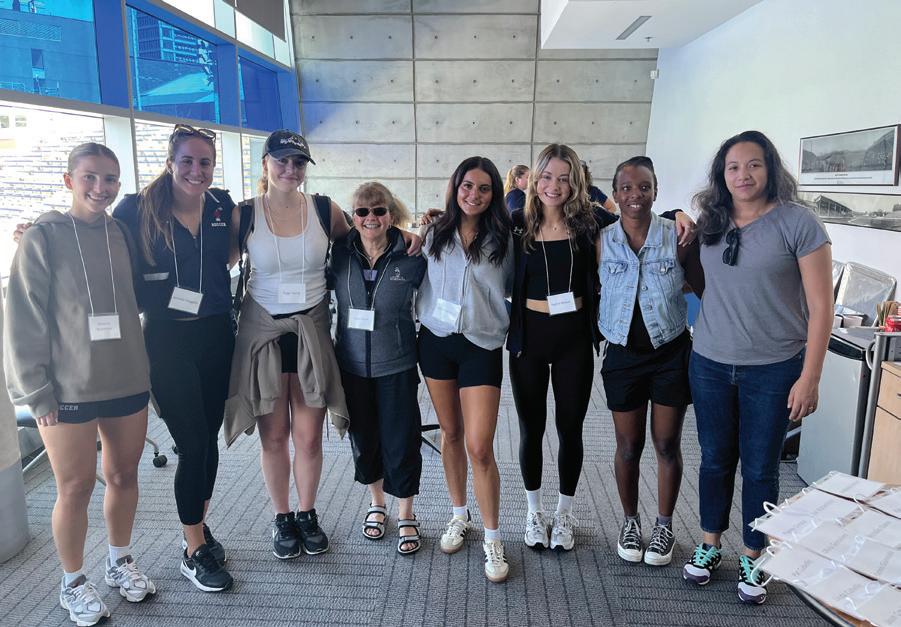
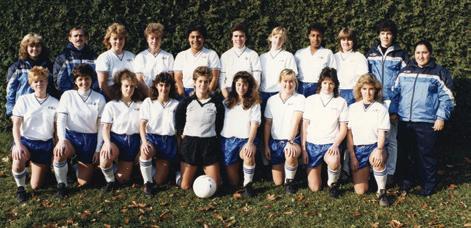
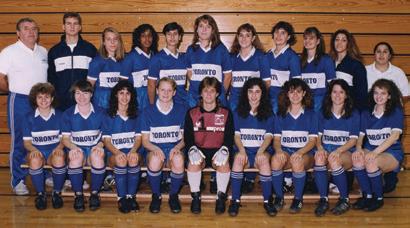

As the Varsity Blues women’s soccer team takes to the field next season, they’ll have the support of one of their predecessors –Susan Koch, who was on the team from 1987 to 1989.
Playing for the Varsity Blues was a huge part of the BComm grad’s university experience.
“Soccer provided such a strong connection to the university,” she recalls. “For three months, we spent hours every day with the same small group of players, coaches and trainers. We became very close.”
That sense of community extended beyond her own team. In Koch’s second year, her sister joined the women’s soccer team at Queen’s University. That year, the two sisters faced off on the pitch.
“My parents drove down from Ottawa to see our teams play each other,” Koch remembers. “It’s a special memory for me.”
Koch went on to become a chartered professional accountant. Her work eventually took her to Calgary, where she worked for a big accounting firm, in industry and even briefly for the City of Calgary. But even after all these years, Toronto retains a place in her heart. Over the last few months, she took several road trips to see her beloved Toronto Maple Leafs, cheering for them in all seven NHL arenas in Canada.
Approaching retirement, Koch started to reflect on her good fortune and wondered what she could do to help someone else. She decided to create the Susan L. Koch Women’s Varsity Soccer Scholarship, to be given each year to an incoming Varsity Blues women’s soccer player based on “excellence in the sport,” which can mean athletic ability, leadership, attitude or heart.
“Toronto is important to me. The university is important to me. And the soccer team is what I remember most about my time there,” Koch explains, noting that there wasn’t much support for women’s soccer in her day. (She had to play on a boy’s team in middle school.) She hopes her gift will help future players financially as they balance academics and athletics, and she hopes it’ll help strengthen the women’s team.
The first scholarship will be granted this fall. With an initial endowment of $50,000 and a bequest of $200,000 in her will, Koch’s gift will fund two $5,000 scholarships a year for as long as the university exists.
“If I win the lottery, I’ll send the rest of the money over sooner,” she says. “I’d love to see it in action.” — CH
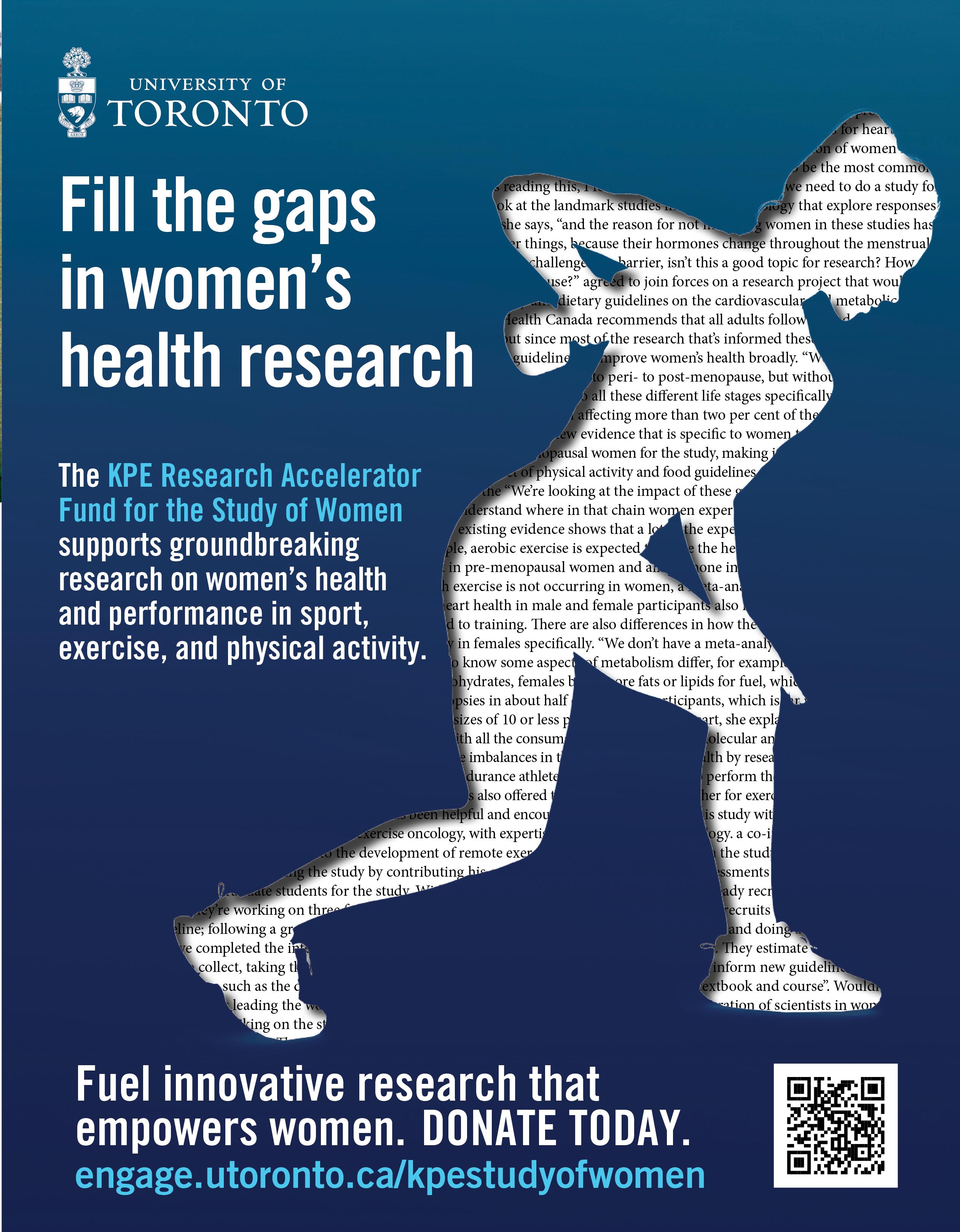

Five former Blues athletes qualified to represent Canada at the 2024 Olympic Games – and were joined in host city Paris by several University of Toronto staff and community members.
Four-time Olympic medalist Kylie Masse was named a co-captain of the Canadian swimming team at the Games, which took place July 26 to August 11, while former Blues badminton star Michelle Li made her fourth Olympic appearance and beach volleyball player Heather Bansley qualified for her third straight Summer Games.
Track and field alumni Jazz Shukla and Lucia Stafford travelled to the City of Light for their first and second Games, respectively.
Meanwhile, at the Paralympic Games, which took place August 28 to September 8, former Varsity Blues rower Alina Dumas represented Brazil as coxswain of its PR3 coxed four crew.
The athletes were joined in Paris by several U of T staff members and alumni.
Byron MacDonald, who entered his 47th season as Varsity Blues swimming head coach, headed to his 10th Olympic Games as a broadcaster, while assistant head coach Linda Kiefer headed to her sixth Olympic Games as a swimming coach. KPE alumnus and U of T staff member Ron Castro was also named a massage therapist to the Canadian swimming team.
Former Varsity Blues volleyball player and head coach Ed Drakich went to his fifth Olympic Games as a volleyball technical official. He also represented Canada as an athlete in 1996.
Jane Thornton, Team Canada’s chief medical officer, earned her Doctor of Medicine from U of T’s Temerty Faculty of Medicine in 2014. Photo/
Here’s a brief snapshot of the U of T community members who represented Canada at the Games:
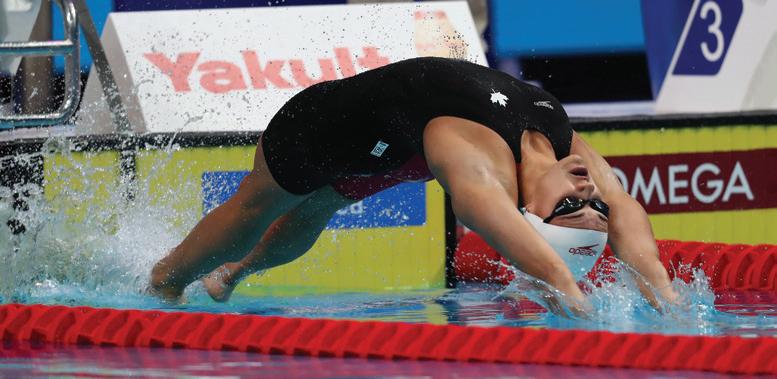
A member of the Varsity Blues swimming team from 2014 to 2019, Masse had already put together a lengthy career full of highlights ahead of her third Olympic appearance.
She claimed her first Olympic medal at the 2016 Rio Games, earning bronze in the 100m backstroke. She then set a new world record while winning the 100m backstroke at the 2017 FINA World Championships in Budapest.
Masse went on to defend her 100m backstroke world championship at the 2019 FINA World Championships in Gwangju, South Korea, propelling her to a three-medal performance at the 2020 Tokyo Games, where she took silver in both the 100m and 200m backstroke events and added a bronze as part of Canada’s 4x100m medley relay.
During her time with the Varsity Blues, Masse went undefeated at five consecutive OUA championships without losing an individual or relay race. The five-time OUA Female Swimmer of the Year, five-time OUA First-Team All-Star and the 2015 OUA Female Rookie of the Year also twice won the Dr. Jeno Tihanyi award for individual medley excellence and earned major grand slams in all three backstroke events. In Paris, Masse took home a bronze medal in the 200m backstroke.
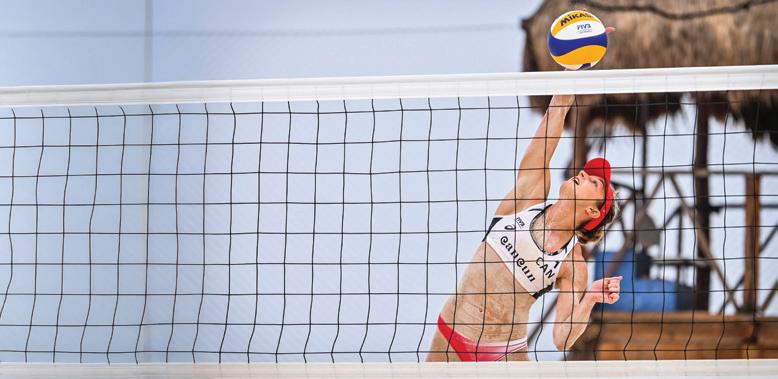
A former Varsity Blues student-athlete between 2005 and 2010 and assistant coach during the 2021–22 season, the Paris Games marked Bansley’s third time representing Canada at the Olympics.
Considered among the best defensive players in the world, she previously competed at the 2020 Tokyo Games and the 2016 Rio Games with partner Brandie Wilkerson, placing fifth overall at both international showcases. Bansley has been a dominant player throughout her career on the FIVB Beach Volleyball World Tour, winning the world’s best defender honour three times (2018, 2016 and 2015). In 2018, she and Wilkerson reached the No. 1 ranking in the world.
While a student-athlete at U of T, Bansley was a two-time All-Canadian who finished first on the OUA and U SPORTS leader board in points, kills and serving aces per set during the 2009–10 season. She helped lead the Blues to a provincial title and a spot in the U SPORTS national championship.

An alumna of the Varsity Blues track and field and cross country teams between 2016 and 2020, Stafford competed in her second Olympic Games after winning her third Canadian women’s 1500m title. A semifinalist at the 2020 Tokyo Games, Stafford set a new Canadian record in the women’s 2000m in her Diamond League debut, breaking the previous mark set 30 years ago by Angela Chalmers.
While with the Blues, Stafford was named both U of T’s T-Holders’ Female Athlete of the Year and the OUA Female Athlete of the Year across all sports in her senior season. She earned individual OUA and U SPORTS gold medals, an OUA silver with the women’s cross country team, nine provincial medals and 10 national medals with the track and field team across her four seasons of competition.

A Varsity Blues track and field and cross country athlete between 2016 and 2022, Shukla qualified for her first Olympic Games after winning the Canadian women’s 800m title. After a steady ascent up the rankings since graduating from U of T, her 1:58.20 time at the Canadian Olympic trials marked the second fastest trials time in North America.
Since jumping back into competition in the 800m event in 2022, Shukla has continued to improve her time with each outing. She competed at the 2023 Canadian National Championships, 2023 World Championships and 2024 World Athletics Indoor Championships. With the U of T cross country team, she earned U SPORTS First Team All-Canadian and OUA First Team All-Star honours in 2021. — JD
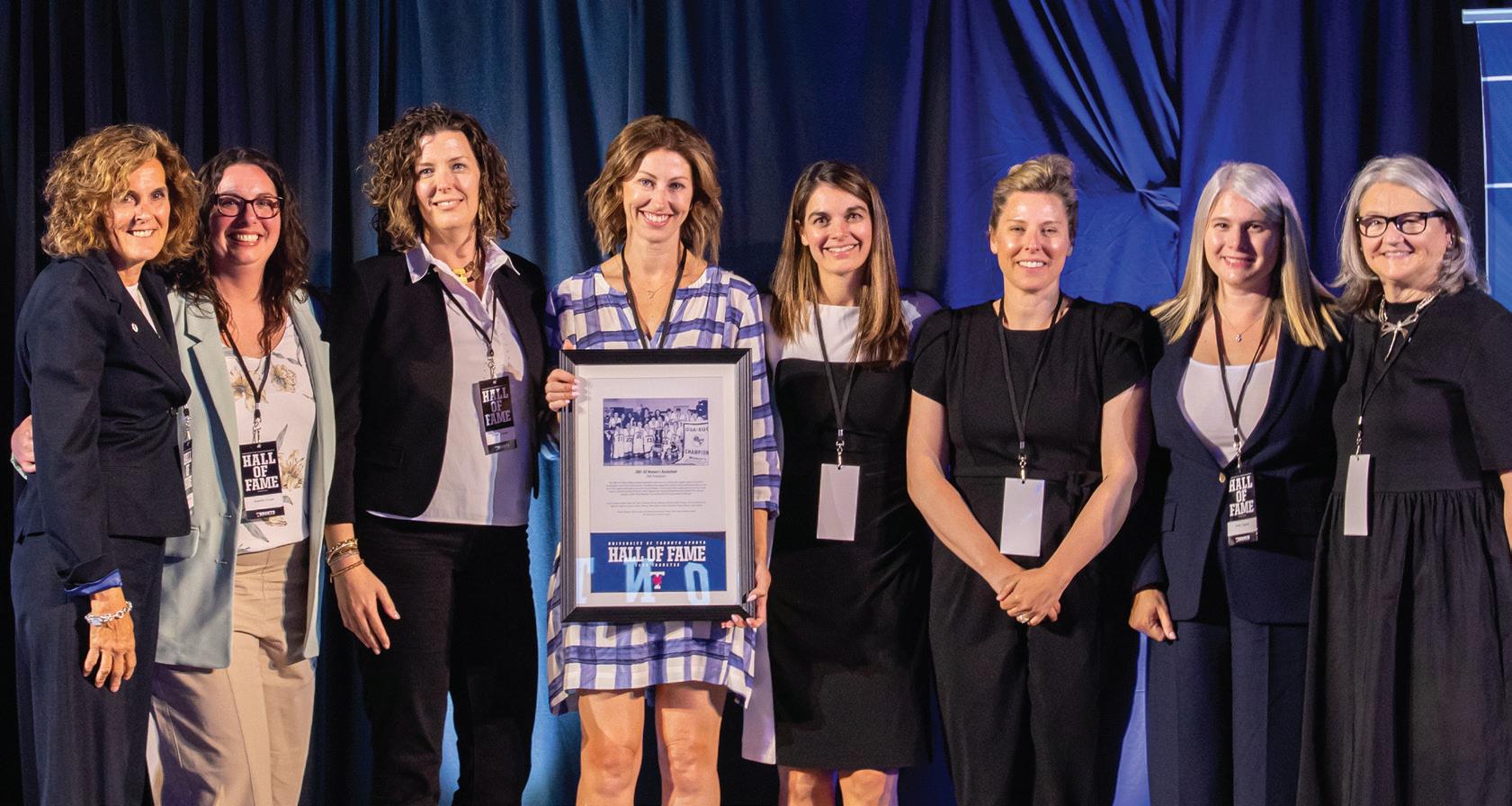
At the 34th U of T Sports Hall of Fame ceremony, 13 individual athletes and six teams were inducted for their outstanding achievements and contributions to athletics.
The first athlete inductee to be called up on stage was Katie Godfrey, a three-time OUA All-Star, who completed her Honours Bachelor of Science while excelling in lacrosse.
“I’m so proud of what we accomplished together,” she said, adding that the camaraderie and teamwork she experienced with the team on the field translated into her personal life, making her a better friend, partner and leader.
Angela Marrocco was captain of the lacrosse team in the 2000–01 season. She completed her medical degree in 2003 and her postgraduate medical training (PGMT) in 2006. Describing her four years at U of T as unforgettable, she said the friendships she made on the lacrosse team have stood the test of time.
Watson swam on the inducted 1991–92 men’s swimming team, which won the Canadian Intercollegiate Athletic Union (CIAU) national championship that year. Speaking on behalf of the team was Mike Rollason, who talked about the ripple effect of being on a championship team.
“We went from being teammates in the pool to becoming lifelong friends spanning decades,” he said.
“We went from being teammates in the pool to becoming lifelong friends spanning decades,”
— Mike Rollason 1991–92 men’s swimming team
Andrea Papamandjaris, who graduated with a Bachelor of Science from Trinity College in 1993, also swam for the Blues and praised the U of T swimming coaches for creating such a close-knit community. She was joined on stage by the inducted 1992–93 women’s swimming team, who were the CIAU champions that year.
Speaking on behalf of the team was the former minister of environment and climate change Catherine McKenna, then captain of the team.
Swimming alumnus Ron Watson graduated from U of T with a Bachelor of Physical Health and Education in 1994. A four time All-Canadian and five time All-Star, Watson talked about the importance of family, which for an athlete extends to this team and coaches.
“Your family drives you to practices, your friends cheer you on and your teammates and coaches push you forward,” he said. “Thank you to U of T for hiring Byron and Linda, the most remarkable coaches bar none.”
“I asked Byron once, what’s the magic of a good team, and he said that being on a team is recognizing the potential of everyone,” she said. “It’s the same in life – you want to be surrounded by great people doing amazing things that you can’t do on your own.”
One after the other, individual athletes, teams and builders got up on stage to receive their certificates and reminisce about their days of representing the university.
Photo/ Barry McCluskey
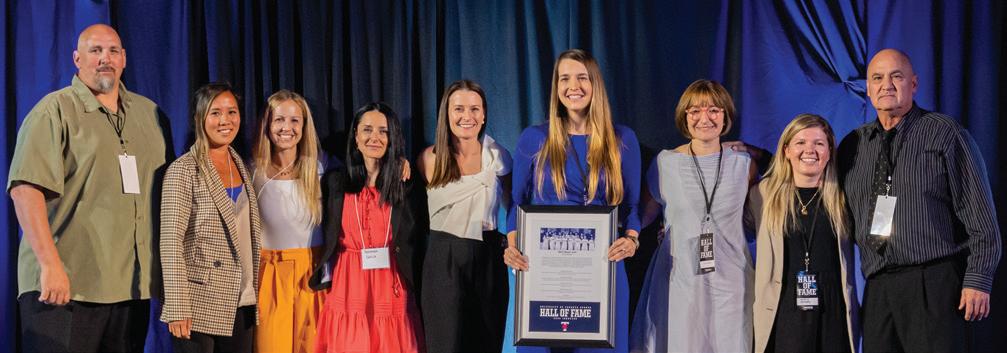

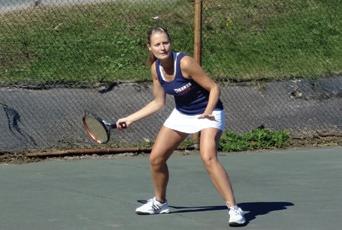
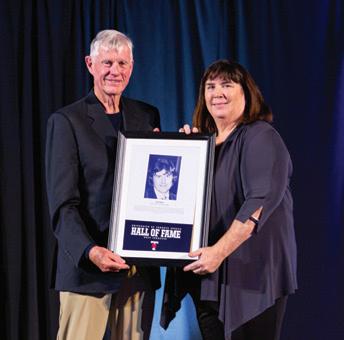



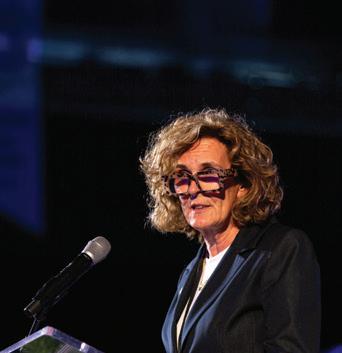
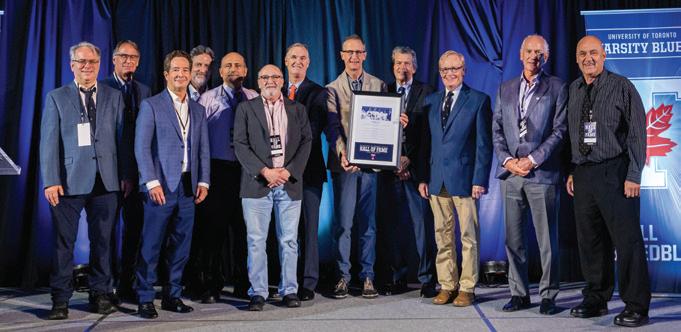

Karlene Headley-Cooper, a multi-sport athlete and threetime graduate from U of T who was a key member of the Varsity Blues fastpitch and squash teams.
Isabel Jarosz, a tennis standout who graduated with an Honours Bachelor of Science from New College in 2008 and a Bachelor of Education in 2012.
The 2004–07 women’s tennis team, which claimed OUA titles in four consecutive seasons and also had many words of praise for their head coach Nabil Tadros.
Rory Hunter, a 1982 Bachelor of Science grad from Trinity College and 1986 dentistry grad, who served as captain of the tennis team during a five-year stretch when U of T claimed five consecutive Ontario Universities Athletics Association (OUAA) team championships.
Don Steele, a 1971 graduate from Victoria College who contributed to the Varsity Blues tennis legacy as both athlete and coach.
The 1979–83 men’s tennis team, which captured five consecutive provincial championship titles between 1979 and 1983.
Jim Ware, who played a crucial role in the university’s first Vanier Cup victory in 1965 and led the team to a Yates Cup triumph in 1967 as co-captain of the team. Ware spearheaded efforts to secure nearly $1 million in endowments for the football program.
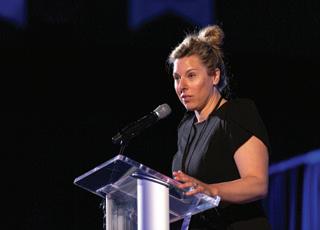

The Right Honourable Sir William Mulock, who served as vice chancellor and chancellor of U of T over a span of 63 years, was inducted posthumously. He served as team captain and organizer of the first documented football game at U of T in 1861, supported university funding for athletic programs and donated the Mulock Cup for intramural competition in 1984.
The 1920–24 men’s rowing team, who were the silver medalists at the 1924 Paris Olympic Games 100 years ago.
Rosana Kelly was inducted posthumously. A 1950 graduate and avid basketball player, she contributed to two championships in 1949 and 1950.
Vanessa Nobrega, a key member of the Varsity Blues women’s basketball team who graduated with a commerce degree in 2004. Nobrega helped lead the Blues to the 2002 OUA championship title.
Michèle Bélanger, who guided the Blues’ women’s basketball program for 41 years, was inducted as a builder. Bélanger coached in 1,358 games, recording 845 wins and guiding the Blues to nine OUA championship titles and a U SPORTS national title.
The 2001–02 women’s basketball team, who went 16–4 during the regular season to finish in second place in the OUA East Division. —JD

Coach Vicky Sunohara inducted into Canada
Coach Vicky Sunohara inducted into Canada
Sports Hall of Fame
Sports Hall of Fame
Varsity Blues women’s ice hockey head coach Vicky Sunohara was inducted into the Canada Sports Hall of Fame in fall 2024 in an induction ceremony held at the Canadian Museum of History in Gatineau, Quebec.
“Thank you so much for this incredible, humbling honour,” Sunohara said in her acceptance speech. “I am so proud to be a part of such an exceptional and diverse class of athletes, builders and trailblazers.”
From 1989 until she retired in 2008, Sunohara was a key member of Canada’s national women’s team, helping them win seven world championships and two gold medals and a silver at three Olympic Games.
After retiring from Team Canada, she got her Bachelor of Physical and Health Education degree from U of T and in 2011 returned to the university as the first full-time head coach of the women’s ice hockey team, winning two provincial championships, four coach of the year awards and a silver medal at the 2024 U SPORTS national championships.
“This recognition has given me a chance to slow down a little bit and reflect on my life, and I can honestly say that I don’t know where I’d be without sport – hockey in particular,” said Sunohara.
Reflecting on the role her parents played in her life, Sunohara shared that she didn’t have much time with her dad, who died when she was only seven years old, but she was thankful for inheriting his passion for sport and his competitiveness.
After her father passed away, her mom was left to raise three kids at age 42.
“I know now as a parent how difficult that must have been, but she made sure I never missed a practice, game or tournament,” said Sunohara.
Sunohara also thanked the coaches and staff at Hockey Canada for having her on the women’s national hockey team for 19 years.
“Those were some of the best years of my life,” she said.
Sunohara has since dedicated herself to teaching the value of what being a good teammate means on and off the ice and describes her role as head coach to U of T’s women’s ice hockey team as a dream job.
Working with youth across the GTA, she has also served as assistant coach for her sons’ minor ice hockey team in the GTA Hockey League (GTHL) for five seasons, while also lending support to KidSport, Hockey 4 Youth and Youth Assisting Youth.
In 2019, she was named Honorary Lieutenant Colonel of the Queen’s Own Rifles of Canada for her exemplary leadership. In 2023, she received the Sakura Award from the Japanese Canadian Cultural Centre for her contributions to enhancing awareness of Japanese culture and heritage in Canada. — JD
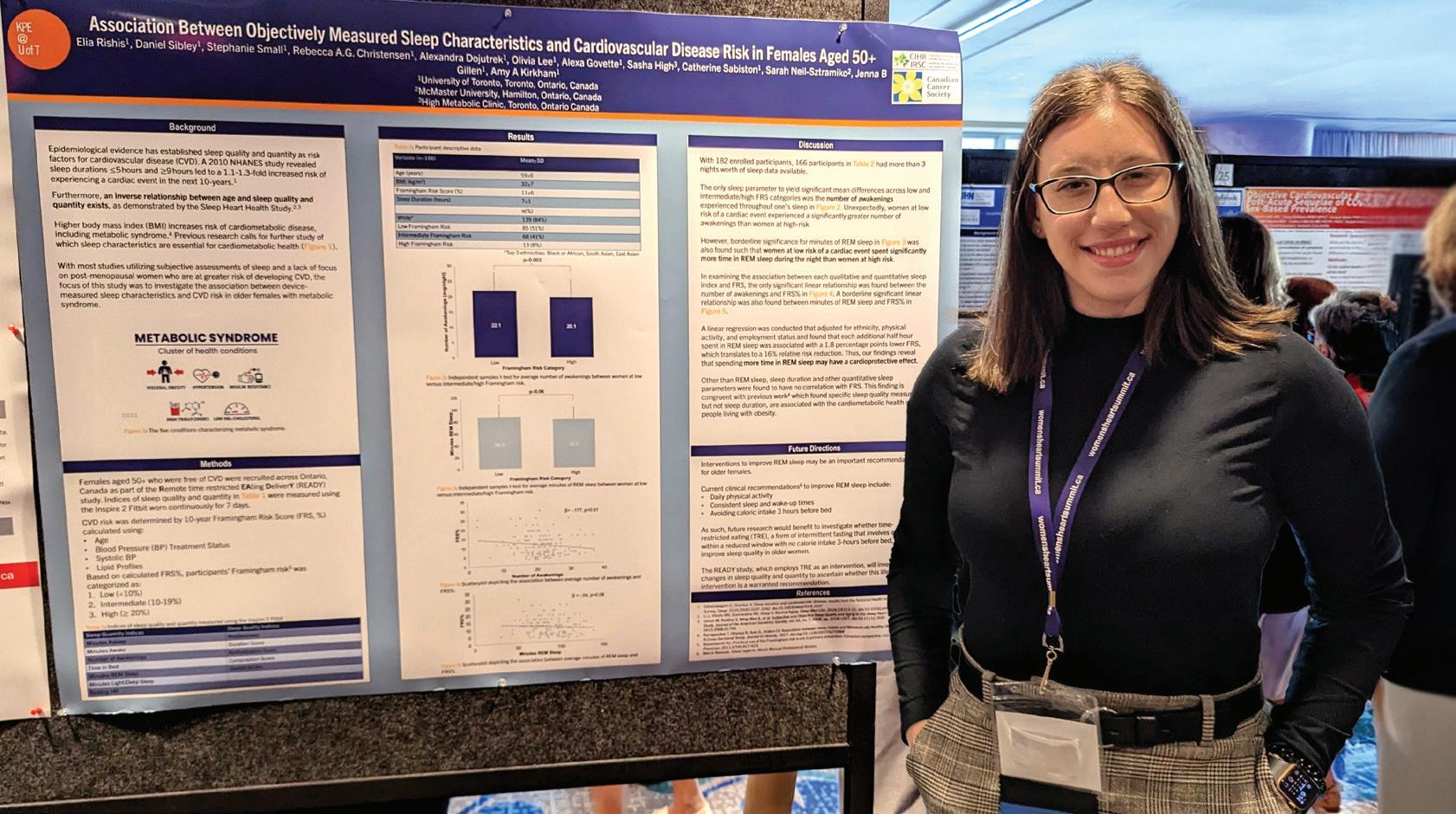
Elia Rishis is off to med school to become advocate for women’s health
Elia Rishis has always had a passion for physical activity and sport. It’s what inspired her to pursue a Bachelor of Science in Kinesiology and Health Sciences at York University, where she completed an undergraduate thesis in sport psychology with Joseph Baker, now a professor of sport science at KPE and chair in sport science, data modelling and sports analytics at the Tanenbaum Institute for Science in Sport.
Rishis went on to complete a Master of Science in Kinesiology at U of T focusing on the study of cardio-oncology, an area of research spearheaded by Assistant Professor Amy Kirkham
Under Kirkham’s supervision, Rishis investigated the effectiveness of the 16-week Health, Exercise, Active Living and Therapeutic Lifestyle (HEALTh) program designed for women with breast cancer, who are at risk of heart disease.
The increased risk of cardiovascular disease (CVD), Rishis explains, is attributed to breast cancer therapies that cause heart muscle injury and dysfunction, which are deemed to be cardiotoxic. Adding to this risk are unhealthy lifestyle behaviours such as physical inactivity and poor diet that persist during and after treatment.
Due to this elevated CVD risk, the American Heart Association released a position statement in 2019 recommending the use of multimodal cardiac rehabilitation (CR) to reduce CVD risk in cancer survivors. Rishis’s thesis was the first to prospectively evaluate the effectiveness of a multimodal CR program in reducing CVD risk in women with breast cancer.
“My work found that a cardiac rehabilitation program tailored to women with breast cancer was effective at improving their VO2peak, which is the gold standard measure of cardiorespiratory fitness and one of the most robust measures of health, longevity and CVD risk,” says Rishis. “Women in the program also experienced significant improvement in their diet quality, cancer-related fatigue and physical activity behaviours.”
In September 2024, Rishis started medical school at U of T’s Temerty Faculty of Medicine.
“I knew from a young age that I wanted to become a doctor,” says Rishis. “The experiences I had during my master’s degree, working with breast cancer survivors at the Toronto Rehabilitation Institute and Sunnybrook Health Sciences Centre, exposed me to clinical medicine and allowed me to work within a team of interdisciplinary health care professionals. These experiences solidified how much I enjoyed hearing patients’ stories and the inquisitive nature of research and continuous learning, and it reaffirmed my desire to pursue medicine.”
Kirkham is not surprised by the path Rishis is pursuing – or her success in getting to this point.
“I am so proud of Elia’s accomplishments and feel confident she will be a strong advocate for women’s health in her future career in medicine.” — JD

F or most of the twentieth century, Varsity Arena was one of the best-known sports facilities in Canada – and next year the historic venue will enter a new era as it marks its centennial.
The venue, home of the Varsity Blues men’s and women’s hockey teams, first opened in 1926 with an exhibition game between the Blues, coached by Conn Smythe, founder of the Toronto Maple Leafs, and the Grads, coached by alumnus Joseph Sullivan, who later served on the U of T Board of Governors and as a Canadian senator. The Grads prevailed 3–0 in a 40-minute match.
The arena was designed by Professor T.R. Loudon, who coached the U of T rowing team, along with architects Messers, Pearson and Darling. Its revolutionary construction made it one of the first indoor arenas to be built without pillar supports obscuring any of its 4,800 seats – an arched design that would soon be ubiquitous in similar venues.
Since its opening, Varsity Arena has been home to countless historic games and tournaments. It was the site of nine Canadian intercollegiate hockey championships between 1973 and 1992, two of which U of T won. In 1972, the Varsity Blues men’s hockey team defeated the USSR student national team 5–1 in a game that marked Canada’s return to international hockey competition after a boycott of almost two years. And in 2003, the Varsity Blues women’s hockey team played to an exciting 1–1 tie with the national team from the People’s Republic of China.
Over the years, the area has hosted examinations, book and clothing sales, political rallies, orchestral performances and even a three-ring circus. Today, the Toronto institution remains one of the key fixtures of U of T athletics and a cornerstone of hockey culture in Canada. — MS

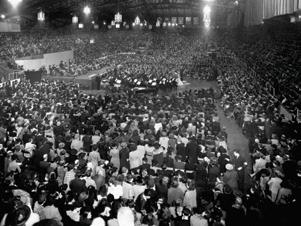
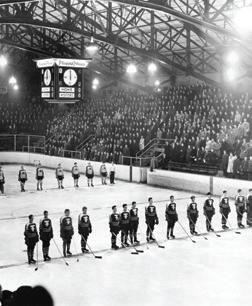
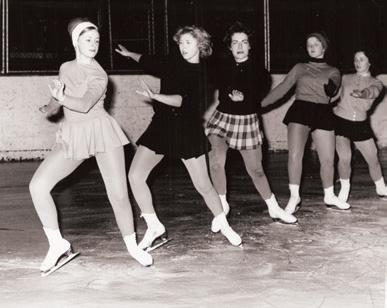


1926: Varsity Arena opens as the first purpose-built indoor facility for ice sports at U of T.
1927: U of T’s centennial ceremonies are held in the arena.
1930s: The Toronto Symphony Orchestra plays roughly 20 shows a year in the venue.
1957: The arena receives its first concrete roof.
1961: The Progressive Conservative Party of Ontario holds its leadership convention in the arena, selecting John Robarts as its leader.
1965: John Diefenbaker holds his final rally in the arena during the final days of his federal election campaign.
1973–74: The Toronto Toros (World Hockey Association) use the arena as their Toronto home before moving to Maple Leaf Gardens the following season.
1977: The arena fails a fire inspection, leading to a large-scale capital fundraising campaign for refurbishment.
1985: Renovations expand the ice sheet to professional standards.
1994: The NHL Players’ Association holds a charity exhibition game at the arena during the league’s lockout.
2005: U of T Governing Council approves a plan to renovate Varsity Arena, rebuild Varsity Stadium and build the Goldring Centre for High Performance Sport.
2026: Varsity Arena celebrates its centennial.
We are improving Varsity Arena for the next 100 years of action! Interested in learning more about how you can support the revitalization project?
We invite you to support the Beth Ali Athletic Scholarship, a newly established annual award that recognizes a Black or Indigenous Varsity Blues woman student-athlete who demonstrates excellence in athletics.
This scholarship celebrates Beth Ali, former Executive Director of Athletics and Physical Activity, and her unwavering commitment to equity, physical activity and student success throughout her remarkable 30-year career at the University of Toronto and Varsity Blues.
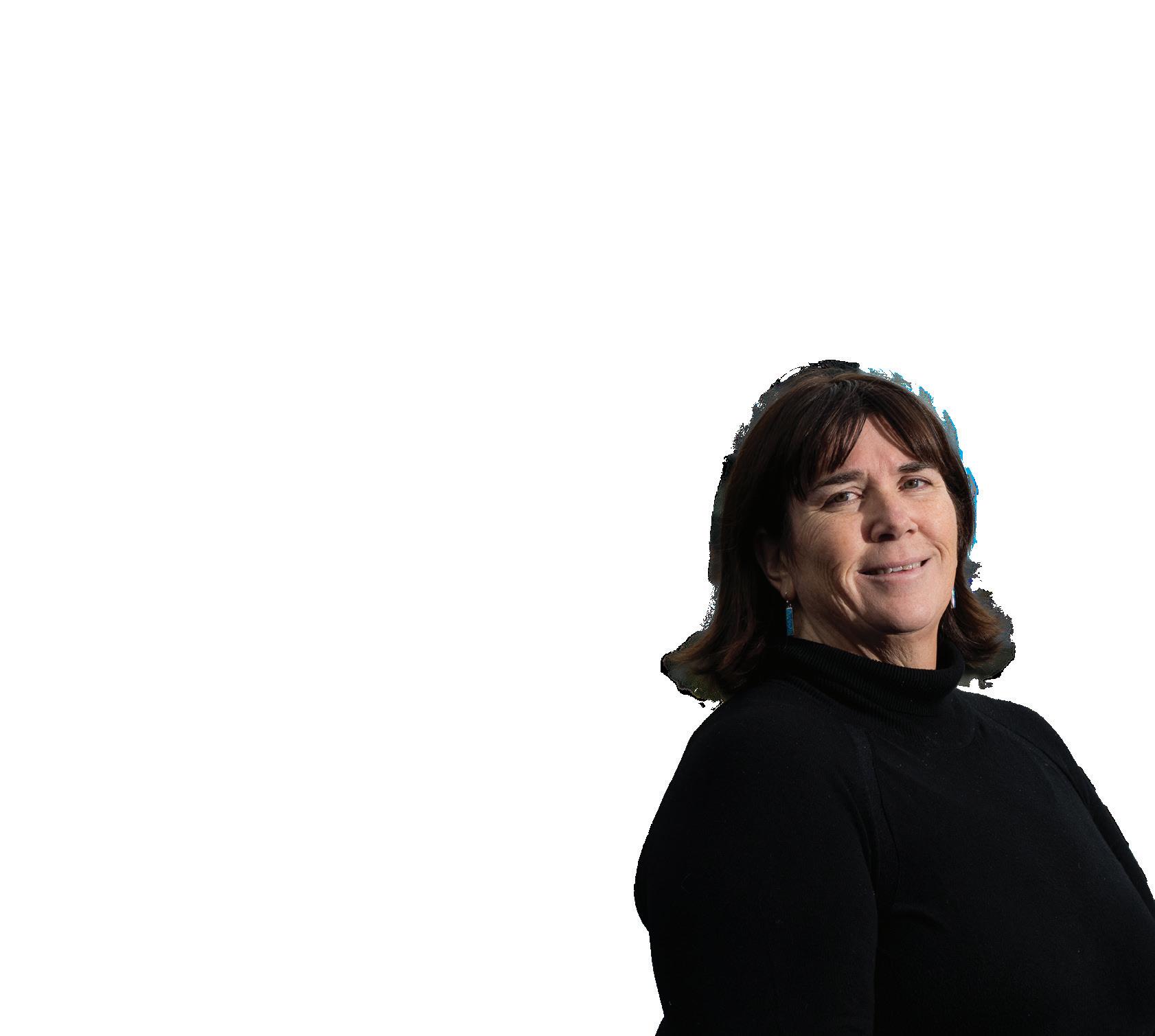
Join us in honouring Beth’s remarkable legacy and empowering the future of Canadian sport.
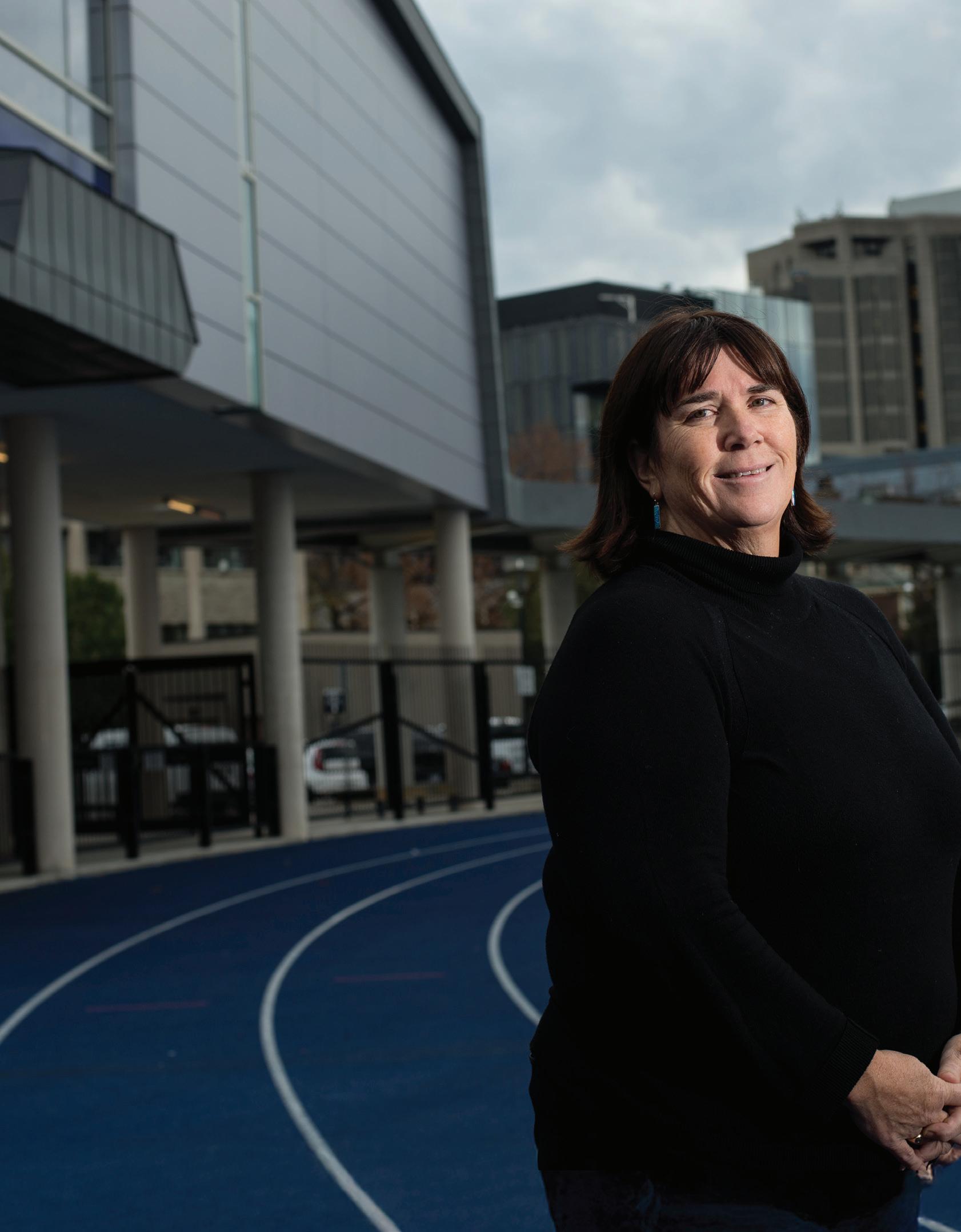
engage.utoronto.ca/bethali
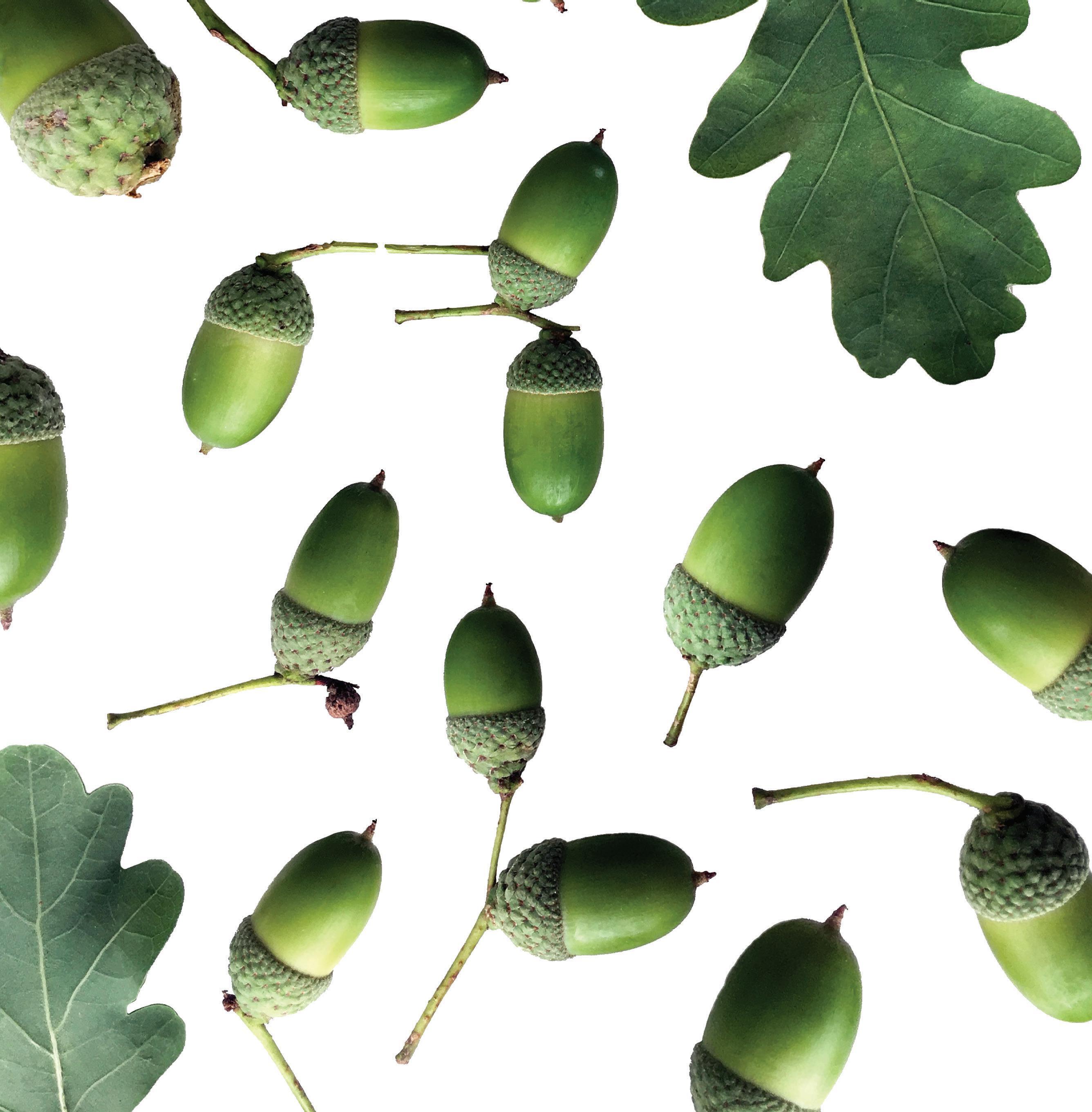
Our U of T days were full of new experiences, and Alumni Reunion 2025 is a chance to create more. Come back this spring to catch up with friends, meet new people and learn something cool together. It’s five fun days of tri-campus activities, including special events at the Faculty of Kinesiology & Physical Education. We can’t wait to see you at the biggest alumni gathering of the year.
Save the date for Alumni Reunion 2025! May 28–June 1
Learn more: alumnireunion.utoronto.ca